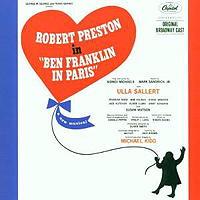 Original Broadway Cast, 1964 (Capito1/DRG)
Original Broadway Cast, 1964 (Capito1/DRG)  (4 / 5) Timing is everything, and this lush show about the life and loves of Benjamin Franklin is an excellent example of the right musical at the wrong time. With its melodic score and literate lyrics, it’s a winsome foray into the mind of Franklin if he had been a musical comedy star as well as a great statesman. But the show is only remembered today as a precursor to the more successful 1776, produced a mere five years later. At any rate, the cast album represents a gem of a lost Broadway musical. It stars Robert Preston, fresh from his stage and screen triumphs in The Music Man; his performance leaps off of the recording and into your lap. The album also features charismatic singing by the Swedish musical theater star Ulla Sallert and the ingenue favorite Susan Watson. Many of the songs by Sidney Michaels and Mark Sandrich, Jr. are topnotch and appropriate to the subject and time period; two numbers, “To Be Alone With You” and “You’re in Paris,” were ghostwritten by the talented young Jerry Herman. Others lapse into a tired operetta genre but, on the whole, this album is a joy to hear and a prime example of showmanship from Broadway’s golden era. — Gerard Alessandrini
(4 / 5) Timing is everything, and this lush show about the life and loves of Benjamin Franklin is an excellent example of the right musical at the wrong time. With its melodic score and literate lyrics, it’s a winsome foray into the mind of Franklin if he had been a musical comedy star as well as a great statesman. But the show is only remembered today as a precursor to the more successful 1776, produced a mere five years later. At any rate, the cast album represents a gem of a lost Broadway musical. It stars Robert Preston, fresh from his stage and screen triumphs in The Music Man; his performance leaps off of the recording and into your lap. The album also features charismatic singing by the Swedish musical theater star Ulla Sallert and the ingenue favorite Susan Watson. Many of the songs by Sidney Michaels and Mark Sandrich, Jr. are topnotch and appropriate to the subject and time period; two numbers, “To Be Alone With You” and “You’re in Paris,” were ghostwritten by the talented young Jerry Herman. Others lapse into a tired operetta genre but, on the whole, this album is a joy to hear and a prime example of showmanship from Broadway’s golden era. — Gerard Alessandrini
Bells Are Ringing
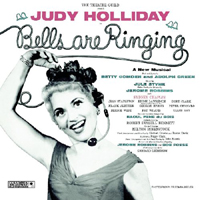 Original Broadway Cast, 1956 (Columbia/Sony)
Original Broadway Cast, 1956 (Columbia/Sony)  (5 / 5) There was only one Judy Holliday, a comic genius who could make you laugh, then break your heart a split second later. Her good friends Betty Comden and Adolph Green provided her with a loving showcase in Bells Are Ringing, and this essential recording preserves one of the great Broadway performances. Holliday stars as Ella Peterson, a lonely operator for the Susanswerphone answering service, who meddles in the lives of her clients. Breaking all the rules, she helps Jeff Moss (Sydney Chaplin), a boozing, self-doubting Broadway playwright, get his career back in order — without revealing her identity. There’s more trouble brewing when another client, Sandor, posing as the head of a classical record company, uses Susanswerphone as the front for a betting ring. This less-than-magisterial plot is fitted out with the most delightful score to come from the long-running partnership of Comden, Green, and Jule Styne. Holliday is given free rein in “It’s a Perfect Relationship,” her fantasy about Jeff; “Is It a Crime?” (her defense of meddling), in which she says that if she’d been around in the days of Romeo and Juliet, “Those two kids would be alive today!”; and the number to end all 11-o’clock numbers, “I’m Going Back.” “Drop That Name,” sung by the chic guests at an Upper East Side party, is a dazzling catalog of celebrities circa 1956, and “The Midas Touch” is a typically funny Comden and Green spoof of nightclub shows. The story’s melancholy undertone comes through in the moving “Long Before I Knew You” and in that ultimate song of resignation, “The Party’s Over.” As Jeff, Sydney Chaplin has a masculine manner and boyish enthusiasm that are real ‘assets, and he partners delightfully with Holliday in the lovely “Just in Time.” Eddie Lawrence is an amusing Sandor — especially when seducing Jean Stapleton as Sue, Ella’s boss and cousin, in the comic waltz “Salzburg.” Peter Gennaro is Holliday’s playmate in the Latin dance spoof “Mu-Cha-Cha.” Robert Russell Bennett’s orchestrations are jaunty and witty. Bonus tracks on the CD include Jule Styne performing “It’s a Perfect Relationship,” “Just in Time,” and the cut song “Boogie, Woogie, Shoogie, Baby.” — David Barbour
(5 / 5) There was only one Judy Holliday, a comic genius who could make you laugh, then break your heart a split second later. Her good friends Betty Comden and Adolph Green provided her with a loving showcase in Bells Are Ringing, and this essential recording preserves one of the great Broadway performances. Holliday stars as Ella Peterson, a lonely operator for the Susanswerphone answering service, who meddles in the lives of her clients. Breaking all the rules, she helps Jeff Moss (Sydney Chaplin), a boozing, self-doubting Broadway playwright, get his career back in order — without revealing her identity. There’s more trouble brewing when another client, Sandor, posing as the head of a classical record company, uses Susanswerphone as the front for a betting ring. This less-than-magisterial plot is fitted out with the most delightful score to come from the long-running partnership of Comden, Green, and Jule Styne. Holliday is given free rein in “It’s a Perfect Relationship,” her fantasy about Jeff; “Is It a Crime?” (her defense of meddling), in which she says that if she’d been around in the days of Romeo and Juliet, “Those two kids would be alive today!”; and the number to end all 11-o’clock numbers, “I’m Going Back.” “Drop That Name,” sung by the chic guests at an Upper East Side party, is a dazzling catalog of celebrities circa 1956, and “The Midas Touch” is a typically funny Comden and Green spoof of nightclub shows. The story’s melancholy undertone comes through in the moving “Long Before I Knew You” and in that ultimate song of resignation, “The Party’s Over.” As Jeff, Sydney Chaplin has a masculine manner and boyish enthusiasm that are real ‘assets, and he partners delightfully with Holliday in the lovely “Just in Time.” Eddie Lawrence is an amusing Sandor — especially when seducing Jean Stapleton as Sue, Ella’s boss and cousin, in the comic waltz “Salzburg.” Peter Gennaro is Holliday’s playmate in the Latin dance spoof “Mu-Cha-Cha.” Robert Russell Bennett’s orchestrations are jaunty and witty. Bonus tracks on the CD include Jule Styne performing “It’s a Perfect Relationship,” “Just in Time,” and the cut song “Boogie, Woogie, Shoogie, Baby.” — David Barbour
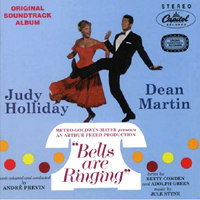 Film Soundtrack, 1960 (CapitollDRG)
Film Soundtrack, 1960 (CapitollDRG)  (2 / 5) The film version of Bells Are Ringing is essential viewing for Holliday’s performance, but the soundtrack album is less interesting. Most of the numbers highlighting Comden and Green’s oddball humor have been cut, including “Is It a Crime?” and “Mu-Cha-Cha.” Much more mysteriously, “Long Before I Knew You” has been eliminated as well. But one nice addition is a jazzy, percussive gem: “Better Than a Dream,” sung by Ella and Jeff at their first meeting. Dean Martin’s crooning as Jeff is a plus, and the two stars sound like they’re having fun in “Just in Time.” If anything, Holliday’s reading of “The Party’s Over” is even more affecting here than on the original recording, and she offers another zesty performance of “I’m Going Back.” Still, it’s not the full score, so stick with the Broadway album. (Note: A very young Hal Linden, who had understudied and replaced Sydney Chaplin on Broadway, turns up as the soloist in “The Midas Touch.”) — D.B.
(2 / 5) The film version of Bells Are Ringing is essential viewing for Holliday’s performance, but the soundtrack album is less interesting. Most of the numbers highlighting Comden and Green’s oddball humor have been cut, including “Is It a Crime?” and “Mu-Cha-Cha.” Much more mysteriously, “Long Before I Knew You” has been eliminated as well. But one nice addition is a jazzy, percussive gem: “Better Than a Dream,” sung by Ella and Jeff at their first meeting. Dean Martin’s crooning as Jeff is a plus, and the two stars sound like they’re having fun in “Just in Time.” If anything, Holliday’s reading of “The Party’s Over” is even more affecting here than on the original recording, and she offers another zesty performance of “I’m Going Back.” Still, it’s not the full score, so stick with the Broadway album. (Note: A very young Hal Linden, who had understudied and replaced Sydney Chaplin on Broadway, turns up as the soloist in “The Midas Touch.”) — D.B.
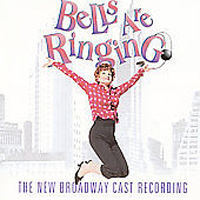 Broadway Cast, 2001 (Fynsworth Alley)
Broadway Cast, 2001 (Fynsworth Alley)  (1 / 5) Faith Prince was at sea in this misbegotten revival, which lacked both hilarity and heart. The disc is much the same; gone are Holliday’s marvelously offhand humor and compelling sadness. Prince projects a tough professionalism that’s at odds with the role of Ella, and her accomplished vocals further rob the character of any vulnerability. However, she does offer a lovely rendition of “The Party’s Over.” Marc Kudisch works much too hard as Jeff, and the strain shows. In the hands of David Garrison and Beth Fowler, the Sandor/Sue subplot falls flat, and Don Sebesky’s brassy, reduced orchestrations pale in comparison to the originals. — D.B.
(1 / 5) Faith Prince was at sea in this misbegotten revival, which lacked both hilarity and heart. The disc is much the same; gone are Holliday’s marvelously offhand humor and compelling sadness. Prince projects a tough professionalism that’s at odds with the role of Ella, and her accomplished vocals further rob the character of any vulnerability. However, she does offer a lovely rendition of “The Party’s Over.” Marc Kudisch works much too hard as Jeff, and the strain shows. In the hands of David Garrison and Beth Fowler, the Sandor/Sue subplot falls flat, and Don Sebesky’s brassy, reduced orchestrations pale in comparison to the originals. — D.B.
Beauty and the Beast
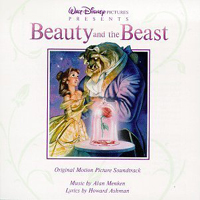 Film Soundtrack, 1991 (Walt Disney Records)
Film Soundtrack, 1991 (Walt Disney Records)  (3 / 5) The soundtrack album of songs from Disney’s highly successful 1991 animated film Beauty and the Beast makes it clear why the material was destined for stage adaptation. (See below.) Paige O’Hara, with her vibrant Broadway belt, is full of warmth as Belle, Jerry Orbach is a delightful Lumière in “Be Our Guest,” and Angela Lansbury as Mrs. Potts is perfect in the title song. Richard White is a grand Gaston, and Robby Benson is just wonderful as the beast. The six Alan Menken-Howard Ashman numbers are orchestrated by Danny Troob with a true Broadway sound. While subsequent stage cast albums include additional songs (with music by Menken and lyrics by Tim Rice), this recording is fun to hear as a reminder of how it all began. — Jeffrey Dunn
(3 / 5) The soundtrack album of songs from Disney’s highly successful 1991 animated film Beauty and the Beast makes it clear why the material was destined for stage adaptation. (See below.) Paige O’Hara, with her vibrant Broadway belt, is full of warmth as Belle, Jerry Orbach is a delightful Lumière in “Be Our Guest,” and Angela Lansbury as Mrs. Potts is perfect in the title song. Richard White is a grand Gaston, and Robby Benson is just wonderful as the beast. The six Alan Menken-Howard Ashman numbers are orchestrated by Danny Troob with a true Broadway sound. While subsequent stage cast albums include additional songs (with music by Menken and lyrics by Tim Rice), this recording is fun to hear as a reminder of how it all began. — Jeffrey Dunn
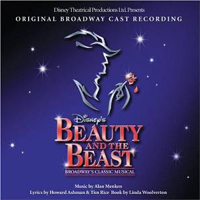 Original Broadway Cast, 1994 (Walt Disney Records)
Original Broadway Cast, 1994 (Walt Disney Records)  (4 / 5) This Broadway cast recording demonstrates how a solid stage score for Beauty and the Beast was created by adding terrific new songs to the film version’s song stack, and it also serves as a document of several fine performances. Susan Egan is a strong-voiced Belle, Terrence Mann an excellent Beast, and Burke Moses the definitive Gaston. Giving fine support are Tom Bosley as Belle’s father in the new song “No Matter What”; Gary Beach, who performs Lumière’s “Be Our Guest” and his part of “Human Again” with great éclat; and Beth Fowler, using her ravishing tones to burnish the title tune. Barbara Marineau as Madame de la Grande Bouche. Stacey Logan as Babette, and Kenny Raskin as Lefou round out the laudable cast. Alan Menken and Tim Rice were perceptive about how to give the film score the additional depth it needed to support a full-length stage musical, and the cast album, like the film soundtrack, boasts orchestrations by Danny Troob. It is now difficult to conceive of Beauty and the Beast without Belle’s “Home,” the Beast’s “If I Can’t Love Her,” and Gaston’s “Me.” This “tale as old as time” is destined for a long life on the world’s stages and on recordings as it introduces youngsters all over the world to the joy of musicals. — J.D.
(4 / 5) This Broadway cast recording demonstrates how a solid stage score for Beauty and the Beast was created by adding terrific new songs to the film version’s song stack, and it also serves as a document of several fine performances. Susan Egan is a strong-voiced Belle, Terrence Mann an excellent Beast, and Burke Moses the definitive Gaston. Giving fine support are Tom Bosley as Belle’s father in the new song “No Matter What”; Gary Beach, who performs Lumière’s “Be Our Guest” and his part of “Human Again” with great éclat; and Beth Fowler, using her ravishing tones to burnish the title tune. Barbara Marineau as Madame de la Grande Bouche. Stacey Logan as Babette, and Kenny Raskin as Lefou round out the laudable cast. Alan Menken and Tim Rice were perceptive about how to give the film score the additional depth it needed to support a full-length stage musical, and the cast album, like the film soundtrack, boasts orchestrations by Danny Troob. It is now difficult to conceive of Beauty and the Beast without Belle’s “Home,” the Beast’s “If I Can’t Love Her,” and Gaston’s “Me.” This “tale as old as time” is destined for a long life on the world’s stages and on recordings as it introduces youngsters all over the world to the joy of musicals. — J.D.
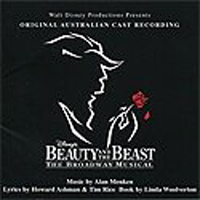 Original Australian Cast, 1995 (Walt Disney Records)
Original Australian Cast, 1995 (Walt Disney Records)  (3 / 5) Hugh Jackman played Gaston in the first Australian company of Beauty and the Beast, making this cast album worthy of attention if only for that reason, but the recording as a whole has great energy. Rachael Peck as Belle is strong in the opening ensemble number, saucy and audibly amused by Gaston in “Me,” and her alternately sweet and powerful voice really opens up in “Home.” As the Beast, baritone Michael Cormick is heart-wrenching in “How Long Can This Go On?” and “If I Can’t Love Her.” Jackman’s delivery of “Me” makes this comic gem his own. In “Gaston,” he is exultant and genuinely funny, assisted by Zachary McKay’s zany Lefou; in later numbers, when his character turns from amusing to evil, Jackman delivers totally. Robyn Arthur is not in great voice for the title song, but her rendition is nevertheless compelling. The rest of the supporting cast is solid without being distinctive. — J.D.
(3 / 5) Hugh Jackman played Gaston in the first Australian company of Beauty and the Beast, making this cast album worthy of attention if only for that reason, but the recording as a whole has great energy. Rachael Peck as Belle is strong in the opening ensemble number, saucy and audibly amused by Gaston in “Me,” and her alternately sweet and powerful voice really opens up in “Home.” As the Beast, baritone Michael Cormick is heart-wrenching in “How Long Can This Go On?” and “If I Can’t Love Her.” Jackman’s delivery of “Me” makes this comic gem his own. In “Gaston,” he is exultant and genuinely funny, assisted by Zachary McKay’s zany Lefou; in later numbers, when his character turns from amusing to evil, Jackman delivers totally. Robyn Arthur is not in great voice for the title song, but her rendition is nevertheless compelling. The rest of the supporting cast is solid without being distinctive. — J.D.
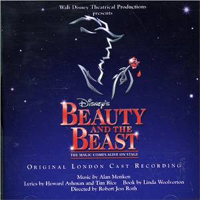 Original London Cast, 1997 (Walt Disney Records)
Original London Cast, 1997 (Walt Disney Records)  (2 / 5) Save for a small cut in “Home,” the content of this album is virtually the same as the Broadway recording (both were produced by Bruce Bornick and Alan Menken). But the overall performance differs in style; it has a gentler quality, and lacks a certain magic. Julie-Alanah Brighten is a very proper Belle with little spunk or fire. Alasdair Harvey is a well-mannered, sweet-voiced Beast; he misses the surface gruffness that’s needed for the role, though he’s moving in the reprise of”If I Can’t Love Her.” Burke Moses again plays Gaston, and he lifts the proceedings with “Me” and “Gaston,” supported in the latter by Richard Gauntlett’s cockney Lefou. Mary Millar is delightful as Mrs. Potts, finding some interesting nuances in the title song. The opening narration by Barry James, who plays Cogsworth, sets the subdued tone for this pleasant if unexceptional recording. — J.D.
(2 / 5) Save for a small cut in “Home,” the content of this album is virtually the same as the Broadway recording (both were produced by Bruce Bornick and Alan Menken). But the overall performance differs in style; it has a gentler quality, and lacks a certain magic. Julie-Alanah Brighten is a very proper Belle with little spunk or fire. Alasdair Harvey is a well-mannered, sweet-voiced Beast; he misses the surface gruffness that’s needed for the role, though he’s moving in the reprise of”If I Can’t Love Her.” Burke Moses again plays Gaston, and he lifts the proceedings with “Me” and “Gaston,” supported in the latter by Richard Gauntlett’s cockney Lefou. Mary Millar is delightful as Mrs. Potts, finding some interesting nuances in the title song. The opening narration by Barry James, who plays Cogsworth, sets the subdued tone for this pleasant if unexceptional recording. — J.D.
 Film Soundtrack, 2017 (Walt Disney Records) No stars; not recommended. This is the soundtrack album of a live-action remake of the animated Disney film of the same title. Since it was not conceived as a big-screen transfer of the stage musical Beauty and the Beast, none of the songs that Alan Menken and Tim Rice wrote for the Broadway show as additions to the original Menken/Ashman score for the animated film were retained; instead, Menken and Rice were enlisted to write another set of new songs. Fans of the stage show will be dissatisfied that “If I Can’t Love Her” (Menken/Rice) and “Human Again” (Menken/Ashman) have been replaced by the inferior “Evermore” and “Days in the Sun,” respectively, and even audiences who are unfamiliar with previous versions of the property may find that these items seem out of place. Though the movie has star power, this is the least vocally impressive of any Beauty and the Beast recording to date. Emma Watson’s singing is colorless and wispy in the role of Belle. She’s paired with the unimpressive Beast of Dan Stevens, both of them sounding heavily autotuned. Emma Thompson, Ewan McGregor, and Luke Evans are fine as Mrs. Potts, Lumière, and Gaston, but none of their performances compare favorably with those of the Broadway or original film casts. Only Audra McDonald as “Madame Garderobe” displays any musical theater prowess, and she’s criminally underused. As for the songs carried over from the 1991 Menken-Ashman score, they suffer greatly here due to a lack of vocal power (“Something There”), fussy orchestrations and arrangements (“Belle”), and/or misguided edits (“Gaston”). The huge commercial success of this film has inspired Disney to continue the live-action-remake trend. Whether this will eventually produce artistically compelling results remains to be seen. — Matt Koplik
Film Soundtrack, 2017 (Walt Disney Records) No stars; not recommended. This is the soundtrack album of a live-action remake of the animated Disney film of the same title. Since it was not conceived as a big-screen transfer of the stage musical Beauty and the Beast, none of the songs that Alan Menken and Tim Rice wrote for the Broadway show as additions to the original Menken/Ashman score for the animated film were retained; instead, Menken and Rice were enlisted to write another set of new songs. Fans of the stage show will be dissatisfied that “If I Can’t Love Her” (Menken/Rice) and “Human Again” (Menken/Ashman) have been replaced by the inferior “Evermore” and “Days in the Sun,” respectively, and even audiences who are unfamiliar with previous versions of the property may find that these items seem out of place. Though the movie has star power, this is the least vocally impressive of any Beauty and the Beast recording to date. Emma Watson’s singing is colorless and wispy in the role of Belle. She’s paired with the unimpressive Beast of Dan Stevens, both of them sounding heavily autotuned. Emma Thompson, Ewan McGregor, and Luke Evans are fine as Mrs. Potts, Lumière, and Gaston, but none of their performances compare favorably with those of the Broadway or original film casts. Only Audra McDonald as “Madame Garderobe” displays any musical theater prowess, and she’s criminally underused. As for the songs carried over from the 1991 Menken-Ashman score, they suffer greatly here due to a lack of vocal power (“Something There”), fussy orchestrations and arrangements (“Belle”), and/or misguided edits (“Gaston”). The huge commercial success of this film has inspired Disney to continue the live-action-remake trend. Whether this will eventually produce artistically compelling results remains to be seen. — Matt Koplik
Bar Mitzvah Boy
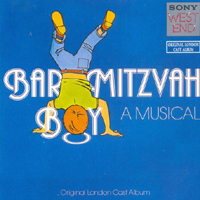 Original London Cast, 1978 (Columbia/Sony)
Original London Cast, 1978 (Columbia/Sony)  (3 / 5) The notes for the CD edition of this recording quote an ad from the theater program, predicting that “the show will be onstage a long time — the album will be on your turntable even longer.” But Bar Mitzvah Boy closed quickly in London. Jack Rosenthal based his book for the musical on his successful British teleplay about a London family planning a bar mitzvah; the title character, Eliot Green, disappears in the midst of the service. This little-known, under-appreciated show has music by Jule Styne and lyrics by Don Black. With Styne returning to his roots (he was Jewish and born in London), the score is one of the better efforts of his late career. Highlights include Eliot’s initial discussion with his rabbi about the meaning of a bar mitzvah, “Why?” / “If Only a Little Bit Sticks”; “The Bar Mitzvah of Eliot Green,” which deals with the tumult of preparing for the event; the parents’ love song, “We’ve Done All Right”; Eliot’s sister’s ballad of reassurance, “You Wouldn’t Be You”; and “Rita’s Request,” a hilarious number for the mother. The score has a unique, Judeo/British, 1970s sound. It’s solid, impressive work even if it’s not in the same league as Styne’s Gypsy or Funny Girl. Directed by Martin Charnin, the strong cast includes many West End theater veterans. The hard-to-find recording is filled with nuggets of pleasure, and Eliot’s final, conciliatory song, “I’ve Just Begun,” is guaranteed to warm the heart of even the most jaded listener. — Jeffrey Dunn
(3 / 5) The notes for the CD edition of this recording quote an ad from the theater program, predicting that “the show will be onstage a long time — the album will be on your turntable even longer.” But Bar Mitzvah Boy closed quickly in London. Jack Rosenthal based his book for the musical on his successful British teleplay about a London family planning a bar mitzvah; the title character, Eliot Green, disappears in the midst of the service. This little-known, under-appreciated show has music by Jule Styne and lyrics by Don Black. With Styne returning to his roots (he was Jewish and born in London), the score is one of the better efforts of his late career. Highlights include Eliot’s initial discussion with his rabbi about the meaning of a bar mitzvah, “Why?” / “If Only a Little Bit Sticks”; “The Bar Mitzvah of Eliot Green,” which deals with the tumult of preparing for the event; the parents’ love song, “We’ve Done All Right”; Eliot’s sister’s ballad of reassurance, “You Wouldn’t Be You”; and “Rita’s Request,” a hilarious number for the mother. The score has a unique, Judeo/British, 1970s sound. It’s solid, impressive work even if it’s not in the same league as Styne’s Gypsy or Funny Girl. Directed by Martin Charnin, the strong cast includes many West End theater veterans. The hard-to-find recording is filled with nuggets of pleasure, and Eliot’s final, conciliatory song, “I’ve Just Begun,” is guaranteed to warm the heart of even the most jaded listener. — Jeffrey Dunn
Bat Boy
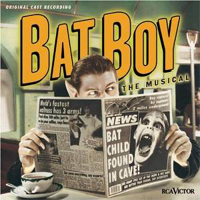 Original Off-Broadway Cast, 2001 (RCA)
Original Off-Broadway Cast, 2001 (RCA)  (2 / 5) Ever since Little Shop of Horrors, Off-Broadway has spawned lots of campy musical sci-fi spoofs. Bat Boy is one of the better ones, though that’s not saying much. The book, by Keythe Farley and Brian Flemming, about the discovery of an alleged “bat child” is a convoluted tale of small-town viciousness, family secrets, and incest, all played for marginal laughs. Still, the wildly uneven score by newcomer Laurence O’Keefe is worth your attention. Interestingly, the most ambitious passages are the most successful. The comic”Show You a Thing or Two”is a mini-masterpiece in which the bat boy, renamed Edgar, is transformed into an Anglophile whiz kid; anyone who can work Ruby Ridge, Cole Porter, and The Remains of the Day into a lyric is OK by me. Also nifty is the first-act closer, “Comfort and Joy,” which advances the plot with speed and wit. And the ballad “Let Me Walk Among You” weds a touching melody to hilariously deadpan lyrics. So how can O’Keefe have also written junky numbers like “Another Dead Cow,” in which the townspeople wonder who killed their livestock, or the tasteless “Children, Children,” an inter-species sex orgy? Similarly, the orchestrations by O’Keefe and Alex Lacamoire range from clever to crass. In the title role, Deven May has a powerful voice and a light comic touch. There’s also skillful work from Kaitlin Hopkins as Edgar’s adoptive mother — her “Three-Bedroom House” brings down the house — and from Kerry Butler as his innocent love interest. Steel yourself for the worst of the score and prepare to enjoy the best. — David Barbour
(2 / 5) Ever since Little Shop of Horrors, Off-Broadway has spawned lots of campy musical sci-fi spoofs. Bat Boy is one of the better ones, though that’s not saying much. The book, by Keythe Farley and Brian Flemming, about the discovery of an alleged “bat child” is a convoluted tale of small-town viciousness, family secrets, and incest, all played for marginal laughs. Still, the wildly uneven score by newcomer Laurence O’Keefe is worth your attention. Interestingly, the most ambitious passages are the most successful. The comic”Show You a Thing or Two”is a mini-masterpiece in which the bat boy, renamed Edgar, is transformed into an Anglophile whiz kid; anyone who can work Ruby Ridge, Cole Porter, and The Remains of the Day into a lyric is OK by me. Also nifty is the first-act closer, “Comfort and Joy,” which advances the plot with speed and wit. And the ballad “Let Me Walk Among You” weds a touching melody to hilariously deadpan lyrics. So how can O’Keefe have also written junky numbers like “Another Dead Cow,” in which the townspeople wonder who killed their livestock, or the tasteless “Children, Children,” an inter-species sex orgy? Similarly, the orchestrations by O’Keefe and Alex Lacamoire range from clever to crass. In the title role, Deven May has a powerful voice and a light comic touch. There’s also skillful work from Kaitlin Hopkins as Edgar’s adoptive mother — her “Three-Bedroom House” brings down the house — and from Kerry Butler as his innocent love interest. Steel yourself for the worst of the score and prepare to enjoy the best. — David Barbour
Barnum
 Original Broadway Cast, 1980 (Columbia/Sony)
Original Broadway Cast, 1980 (Columbia/Sony)  (2 / 5) This Jim Dale vehicle has a book by Mark Bramble, music by Cy Coleman, and lyrics by Michael Stewart. A fictionalized biography of the showman P.T. Barnum, it’s really a series of production numbers looking for a musical. There is a sort-of plot about Barnum’s up-and-down marriage to the disapproving Charity (a young, chipper Glenn Close), but the real drawing cards were Joe Layton’s inventive staging, Dale’s inexhaustible energy, and the manically cheerful score. Coleman and Stewart’s work is thoroughly professional, especially the witty “There Is a Sucker Born Every Minute” and the catchy “Thank God I’m Old” (sung by Terri White as one of Barnum’s attractions, allegedly the oldest woman in the world). And just try to get the Act II opening march “Come Follow the Band” out of your head. But the score could use a dose of Ritalin; even the ballads are extroverted, and Hershy Kay’s orchestrations add to the forced cheerfulness. — David Barbour
(2 / 5) This Jim Dale vehicle has a book by Mark Bramble, music by Cy Coleman, and lyrics by Michael Stewart. A fictionalized biography of the showman P.T. Barnum, it’s really a series of production numbers looking for a musical. There is a sort-of plot about Barnum’s up-and-down marriage to the disapproving Charity (a young, chipper Glenn Close), but the real drawing cards were Joe Layton’s inventive staging, Dale’s inexhaustible energy, and the manically cheerful score. Coleman and Stewart’s work is thoroughly professional, especially the witty “There Is a Sucker Born Every Minute” and the catchy “Thank God I’m Old” (sung by Terri White as one of Barnum’s attractions, allegedly the oldest woman in the world). And just try to get the Act II opening march “Come Follow the Band” out of your head. But the score could use a dose of Ritalin; even the ballads are extroverted, and Hershy Kay’s orchestrations add to the forced cheerfulness. — David Barbour
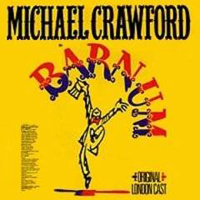 London Cast, 1981 (Chrysalis/no CD)
London Cast, 1981 (Chrysalis/no CD)  (1 / 5) Michael Crawford had one of his biggest pre-Phantom triumphs in the title role, but this recording of the London Barnum pales next to the Broadway original. Crawford’s performance was touted as having topped Jim Dale’s in terms of physical stunts — a video of this production was made, and is still available commercially — but on the cast album, his more relaxed interpretation lacks pizzazz. If he generally sings better than Dale, the energy of the role’s creator is much missed. Deborah Grant’s Charity is a colorless and vocally uninteresting presence; even Glenn Close naysayers are likely to prefer Close’s singing. The best work here comes from Jennie McGustle, whose zesty rendition of “Thank God I’m Old” is almost worthy of Terri White. As Jenny Lind, Sarah Payne sports an accent as thick as a slice of sacher torte, turning the first-act ballad “Love Makes Fools of Us All” into a mush of vowel sounds. Also missing are the brief musical “chases” between various sections of the show. There are hints of a different approach in a revised opening, which begins with a rather ghostly pipe organ, and a slightly different song order that places Tom Thumb’s solo, “Bigger Isn’t Better,” in the second act. The orchestrations sound altered a bit, with a country fiddle appearing prominently in “Museum Song” and “I Like Your Style.” But overall, next to the original, this disc is so much humbug. — D.B.
(1 / 5) Michael Crawford had one of his biggest pre-Phantom triumphs in the title role, but this recording of the London Barnum pales next to the Broadway original. Crawford’s performance was touted as having topped Jim Dale’s in terms of physical stunts — a video of this production was made, and is still available commercially — but on the cast album, his more relaxed interpretation lacks pizzazz. If he generally sings better than Dale, the energy of the role’s creator is much missed. Deborah Grant’s Charity is a colorless and vocally uninteresting presence; even Glenn Close naysayers are likely to prefer Close’s singing. The best work here comes from Jennie McGustle, whose zesty rendition of “Thank God I’m Old” is almost worthy of Terri White. As Jenny Lind, Sarah Payne sports an accent as thick as a slice of sacher torte, turning the first-act ballad “Love Makes Fools of Us All” into a mush of vowel sounds. Also missing are the brief musical “chases” between various sections of the show. There are hints of a different approach in a revised opening, which begins with a rather ghostly pipe organ, and a slightly different song order that places Tom Thumb’s solo, “Bigger Isn’t Better,” in the second act. The orchestrations sound altered a bit, with a country fiddle appearing prominently in “Museum Song” and “I Like Your Style.” But overall, next to the original, this disc is so much humbug. — D.B.
The Band Wagon
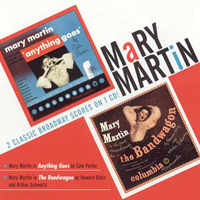 Studio Cast, 1950 (Columbia/Sony)
Studio Cast, 1950 (Columbia/Sony)  (1 / 5) One of the great 1930s Broadway revues, The Band Wagon (1931) was graced with a terrific Arthur Schwartz-Howard Dietz score, including “Dancing in the Dark” and “I Love Louisa,” and a fine cast. It contained too good a collection of songs to pass away when something as temporal as a revue had closed. There was a mangled, sort-of-musical film version in 1949, titled Dancing in the Dark — and then, of course, the 1953 Fred Astaire-Cyd Charisse classic. (See below.) Coming between them, at the dawn of the LP era, was a recording by Mary Martin. This can in no way be termed a re-creation of the original score; instead, it offers a big star singing the show’s best numbers, packaged with Martin’s recordings of several songs from Cole Porter’s Anything Goes to fill out the album. The star is in great voice, but don’t expect any probing vocal drama here — or, indeed, anything other than perfunctory commitment. This is simply a group of fine songs performed in a resoundingly professional manner but with no theatrical flavor. — Richard Barrios
(1 / 5) One of the great 1930s Broadway revues, The Band Wagon (1931) was graced with a terrific Arthur Schwartz-Howard Dietz score, including “Dancing in the Dark” and “I Love Louisa,” and a fine cast. It contained too good a collection of songs to pass away when something as temporal as a revue had closed. There was a mangled, sort-of-musical film version in 1949, titled Dancing in the Dark — and then, of course, the 1953 Fred Astaire-Cyd Charisse classic. (See below.) Coming between them, at the dawn of the LP era, was a recording by Mary Martin. This can in no way be termed a re-creation of the original score; instead, it offers a big star singing the show’s best numbers, packaged with Martin’s recordings of several songs from Cole Porter’s Anything Goes to fill out the album. The star is in great voice, but don’t expect any probing vocal drama here — or, indeed, anything other than perfunctory commitment. This is simply a group of fine songs performed in a resoundingly professional manner but with no theatrical flavor. — Richard Barrios
 Film Soundtrack, 1953 (MGM/Rhino-Turner)
Film Soundtrack, 1953 (MGM/Rhino-Turner)  (4 / 5) Fans of this film may not be aware that Fred Astaire starred in The Band Wagon on Broadway in 1931 as well. The movie adds Schwartz-Dietz songs from other shows, and a new gem written for the movie, the evergreen showbiz hymn “That’s Entertainment!” The plot has little or nothing to do with The Band Wagon as it existed on stage, but Astaire is in fine company here: Jack Buchanan, Oscar Levant, and the effervescent Nanette Fabray in her only good film role. Cyd Charisse, one of Astaire’s finest dance partners, is dubbed by India Adams — a good singer, but this is not the best of such match-ups. Two outtake recordings of songs cut from the film are special treats: Fabray’s “Got a Bran’ New Suit,” originally from the Schwartz & Dietz revue At Home Abroad, and Adams’ rendition of “Two-Faced Woman.” (The latter recording was later used in the film Torch Song, with Joan Crawford — in blackface! — lip-synching to Adams’ vocal.) Although this soundtrack CD is obviously not a memento of the show as performed on Broadway, it’s crammed with musical pleasures. — R.B.
(4 / 5) Fans of this film may not be aware that Fred Astaire starred in The Band Wagon on Broadway in 1931 as well. The movie adds Schwartz-Dietz songs from other shows, and a new gem written for the movie, the evergreen showbiz hymn “That’s Entertainment!” The plot has little or nothing to do with The Band Wagon as it existed on stage, but Astaire is in fine company here: Jack Buchanan, Oscar Levant, and the effervescent Nanette Fabray in her only good film role. Cyd Charisse, one of Astaire’s finest dance partners, is dubbed by India Adams — a good singer, but this is not the best of such match-ups. Two outtake recordings of songs cut from the film are special treats: Fabray’s “Got a Bran’ New Suit,” originally from the Schwartz & Dietz revue At Home Abroad, and Adams’ rendition of “Two-Faced Woman.” (The latter recording was later used in the film Torch Song, with Joan Crawford — in blackface! — lip-synching to Adams’ vocal.) Although this soundtrack CD is obviously not a memento of the show as performed on Broadway, it’s crammed with musical pleasures. — R.B.
Ballroom
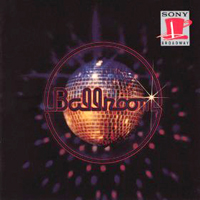 Original Broadway Cast, 1978 (Columbia/Sony)
Original Broadway Cast, 1978 (Columbia/Sony)  (1 / 5) Michael Bennett’s big post-Chorus Line flop is beloved by those who saw it, but sadly, the show’s special qualities are not retained on an audio-only disc. Jerome Kass’s libretto is based on his script for the television film Queen of the Stardust Ballroom. Dorothy Loudon stars as Bea, a lonely Bronx widow who finds glamour and romance at the local dance palace. Fans remember Loudon’s performance and Bennett’s magical staging, but the score by Billy Goldenberg and Alan and Marilyn Bergman contains only a handful of book numbers; everything else consists of dance sequences featuring faux-pop hits covered by the ballroom’s house singers. These tunes are very pleasant in a Steve-and-Eydie kind of way, especially in Jonathan Tunick’s orchestrations, but they don’t convey a sense of the show’s story. Given a chance, Loudon scores big — especially with her nervy, volatile delivery of the scorching 11 o’clock number “Fifty Percent,” in which Bea chooses to accept the love of a married man (played by Vincent Gardenia). Overall, the recording is a disappointment, but if you want to understand what made Loudon one of the most distinct theatrical personalities of all time, it’s worth a listen — David Barbour
(1 / 5) Michael Bennett’s big post-Chorus Line flop is beloved by those who saw it, but sadly, the show’s special qualities are not retained on an audio-only disc. Jerome Kass’s libretto is based on his script for the television film Queen of the Stardust Ballroom. Dorothy Loudon stars as Bea, a lonely Bronx widow who finds glamour and romance at the local dance palace. Fans remember Loudon’s performance and Bennett’s magical staging, but the score by Billy Goldenberg and Alan and Marilyn Bergman contains only a handful of book numbers; everything else consists of dance sequences featuring faux-pop hits covered by the ballroom’s house singers. These tunes are very pleasant in a Steve-and-Eydie kind of way, especially in Jonathan Tunick’s orchestrations, but they don’t convey a sense of the show’s story. Given a chance, Loudon scores big — especially with her nervy, volatile delivery of the scorching 11 o’clock number “Fifty Percent,” in which Bea chooses to accept the love of a married man (played by Vincent Gardenia). Overall, the recording is a disappointment, but if you want to understand what made Loudon one of the most distinct theatrical personalities of all time, it’s worth a listen — David Barbour
The Baker’s Wife
 Original Cast, 1976 (Take Home Tunes)
Original Cast, 1976 (Take Home Tunes)  (5 / 5) This beautiful cast album continues to mystify listeners as to why The Baker’s Wife was a huge flop. Based on the play and subsequent film La femme du boulanger by Marcel Pagnol and Jean Giono, the musical has a book by Joseph Stein, with music and lyrics by Stephen Schwartz. Set in long-ago provincial France, the fable-like story revolves around a middle-aged baker’s young wife who leaves him for a torrid affair with a handsome, young villager. The show closed on the road to Broadway, and most of the cast and creative-team members were replaced during its lengthy tryout tour. When it finally shuttered in Washington, the leads were Paul Sorvino, whose semi-operatic voice sounds great in the role of Aimable, the baker, on this abridged recording of the score; Patti LuPone as his wife, Genevieve, belting to high heaven when she has to, but wonderfully warm in the more lyrical songs; Kurt Peterson, appropriately sexy as her young lover, Dominique; and the silvery-voiced Teri Ralston as Denise, a village woman who gets to sing the lilting “Chanson.” All 10 selections on the album are superb, from character-establishing numbers such as “Merci, Madame” to ravishing ballads including “Gifts of Love,” a gorgeous and poignant piece in which Genevieve resigns herself to a marriage that’s based on companionship rather than passion. The most famous item from the score, and deservedly so, is “Meadowlark,” the magnificent story-song that the baker’s wife belts out when deciding to go off with her young stud; another well-known highlight is “Proud Lady,” sung by the strutting peacock Dominique. Schwartz’s score differs impressively from the more pop/rock style of his monster hits Godspell and Pippin, and the recording boasts lovely orchestrations. — Michael Portantiere
(5 / 5) This beautiful cast album continues to mystify listeners as to why The Baker’s Wife was a huge flop. Based on the play and subsequent film La femme du boulanger by Marcel Pagnol and Jean Giono, the musical has a book by Joseph Stein, with music and lyrics by Stephen Schwartz. Set in long-ago provincial France, the fable-like story revolves around a middle-aged baker’s young wife who leaves him for a torrid affair with a handsome, young villager. The show closed on the road to Broadway, and most of the cast and creative-team members were replaced during its lengthy tryout tour. When it finally shuttered in Washington, the leads were Paul Sorvino, whose semi-operatic voice sounds great in the role of Aimable, the baker, on this abridged recording of the score; Patti LuPone as his wife, Genevieve, belting to high heaven when she has to, but wonderfully warm in the more lyrical songs; Kurt Peterson, appropriately sexy as her young lover, Dominique; and the silvery-voiced Teri Ralston as Denise, a village woman who gets to sing the lilting “Chanson.” All 10 selections on the album are superb, from character-establishing numbers such as “Merci, Madame” to ravishing ballads including “Gifts of Love,” a gorgeous and poignant piece in which Genevieve resigns herself to a marriage that’s based on companionship rather than passion. The most famous item from the score, and deservedly so, is “Meadowlark,” the magnificent story-song that the baker’s wife belts out when deciding to go off with her young stud; another well-known highlight is “Proud Lady,” sung by the strutting peacock Dominique. Schwartz’s score differs impressively from the more pop/rock style of his monster hits Godspell and Pippin, and the recording boasts lovely orchestrations. — Michael Portantiere
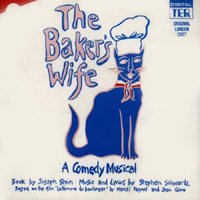 Original London Cast, 1990 (JAY, 2CDs)
Original London Cast, 1990 (JAY, 2CDs)  (1 / 5) Even as musical theater completists appreciate the fact that a high-profile London production of The Baker’s Wife yielded this much lengthier recording of the score, it must be said that the results are unpersuasive in terms of both text and performance. Directed by Trevor Nunn, this version has some new Stephen Schwartz songs, along with several that were in the original production but not previously recorded. Still, the two-CD album is disconcerting. First of all, as presented here, the songs carried over from the earlier recording have many unfamiliar lyrics; Schwartz has a penchant for tinkering with his own work after the fact, but it’s hard to understand the point of such revisions when the new lyrics don’t represent an improvement over the originals. In “Chanson,” for example, we now hear lyrics about gulls crying rather than sheep bleating. Was this change necessary? Severely truncated as the original recording is, it’s sad to report that the new/old songs included on the JAY recording aren’t very interesting. Many of them involve the villagers gossiping about the Aimable-Genevieve-Dominique affair (although, here, the young man’s name is spelled “Dominic”). As for the leading players: Alun Armstrong’s fine acting can’t compensate for his substandard singing voice, plus he sings the baker’s songs in much lower keys than Paul Sorvino’s, with dispiriting results. The plum role of Genevieve is filled by Shar Lee Hill, who is…no Patti LuPone. As Dominic, Drue Williams sings poorly and sounds effeminate, which certainly doesn’t work for this character. Jill Martin displays the best voice of all the London principals in Denise’s “Chanson,” but here again, the song is performed in a considerably lower key than on the American cast album, and is therefore far less effective. — M.P.
(1 / 5) Even as musical theater completists appreciate the fact that a high-profile London production of The Baker’s Wife yielded this much lengthier recording of the score, it must be said that the results are unpersuasive in terms of both text and performance. Directed by Trevor Nunn, this version has some new Stephen Schwartz songs, along with several that were in the original production but not previously recorded. Still, the two-CD album is disconcerting. First of all, as presented here, the songs carried over from the earlier recording have many unfamiliar lyrics; Schwartz has a penchant for tinkering with his own work after the fact, but it’s hard to understand the point of such revisions when the new lyrics don’t represent an improvement over the originals. In “Chanson,” for example, we now hear lyrics about gulls crying rather than sheep bleating. Was this change necessary? Severely truncated as the original recording is, it’s sad to report that the new/old songs included on the JAY recording aren’t very interesting. Many of them involve the villagers gossiping about the Aimable-Genevieve-Dominique affair (although, here, the young man’s name is spelled “Dominic”). As for the leading players: Alun Armstrong’s fine acting can’t compensate for his substandard singing voice, plus he sings the baker’s songs in much lower keys than Paul Sorvino’s, with dispiriting results. The plum role of Genevieve is filled by Shar Lee Hill, who is…no Patti LuPone. As Dominic, Drue Williams sings poorly and sounds effeminate, which certainly doesn’t work for this character. Jill Martin displays the best voice of all the London principals in Denise’s “Chanson,” but here again, the song is performed in a considerably lower key than on the American cast album, and is therefore far less effective. — M.P.
Baker Street
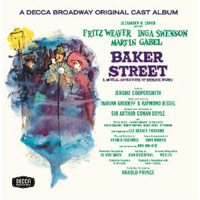 Original Broadway Cast, 1965 (MGM/Decca)
Original Broadway Cast, 1965 (MGM/Decca)  (2 / 5) One of the last in the cycle of My Fair Lady wannabes, Baker Street is complete with handsome Victorian settings, a misogynistic hero (Sherlock Holmes), and a Cockney chorus high-kicking all over London. The problem was that songwriters Marian Grudeff and Raymond Jessel emphatically were not Lerner and Loewe, not even with Bock and Harnick ghostwriting three numbers (”I’m in London Again,” “Cold Clear World,” and “I Shall Miss You”) during the troubled tryout period. The melodic lines are facile, the lyrics occasionally intricate — as in the ironically named “It’s So Simple” — yet it’s all on the surface. As Holmes, Fritz Weaver is fine, but he can’t make anything memorable of the material. His leading lady, Inga Swenson, by all accounts impressive onstage, doesn’t come across on this recording. Even the old-fashioned, three-part, would-be showstopper “Letters” lands with a thud. Martin Gabel as Moriarty, Peter Sallis as Watson, and Teddy Green as a leading Baker Street Irregular round out the cast; they all work hard, but in vain. Although the album is well designed, with color photos and a verbose synopsis, it never convinces you that this was “the hottest musical of 1965.” It’s worth noting that an even shorter-lived show from that year, Drat! The Cat!, had one throwaway number in it (“Holmes and Watson”) that encapsulated what was special about the duo better than this entire score. — Marc Miller
(2 / 5) One of the last in the cycle of My Fair Lady wannabes, Baker Street is complete with handsome Victorian settings, a misogynistic hero (Sherlock Holmes), and a Cockney chorus high-kicking all over London. The problem was that songwriters Marian Grudeff and Raymond Jessel emphatically were not Lerner and Loewe, not even with Bock and Harnick ghostwriting three numbers (”I’m in London Again,” “Cold Clear World,” and “I Shall Miss You”) during the troubled tryout period. The melodic lines are facile, the lyrics occasionally intricate — as in the ironically named “It’s So Simple” — yet it’s all on the surface. As Holmes, Fritz Weaver is fine, but he can’t make anything memorable of the material. His leading lady, Inga Swenson, by all accounts impressive onstage, doesn’t come across on this recording. Even the old-fashioned, three-part, would-be showstopper “Letters” lands with a thud. Martin Gabel as Moriarty, Peter Sallis as Watson, and Teddy Green as a leading Baker Street Irregular round out the cast; they all work hard, but in vain. Although the album is well designed, with color photos and a verbose synopsis, it never convinces you that this was “the hottest musical of 1965.” It’s worth noting that an even shorter-lived show from that year, Drat! The Cat!, had one throwaway number in it (“Holmes and Watson”) that encapsulated what was special about the duo better than this entire score. — Marc Miller
Bajour
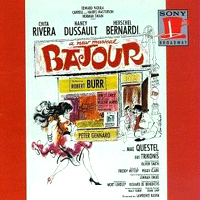 Original Broadway Cast, 1964 (Columbia/Sony) No stars; not recommended. Some ethnic groups have all the luck — and some don’t. The same year that Fiddler on the Roof so beautifully celebrated the joys and sorrows of Jewish life, Bajour featured Nancy Dussault as an NYU anthropology major who latches onto a tribe of gypsies led by Herschel Bernardi. Top-billed Chita Rivera plays the daughter of a rival tribe, doing her trademark spitfire thing and belting out cheesy numbers like “Mean.” Ernest Kincy’s libretto and Walter Marks’ score (astonishingly, inspired by New Yorker stories by Joseph Mitchell) are a mishmash of gypsy intrigue that’s enough to induce a heart attack in the politically correct. The recording starts off with a dynamic overture orchestrated by Mort Lindsey and Dussault’s amusing “Where Is the Tribe for Me?” But too often, Bajour is merely desperate and loud. The second-act show-stopper, “Honest Man,” with Bernardi and rival gypsy king Herbert Edelman trying to con each other, is pretty embarrassing. Give it one star if you’re a Chita fan. — David Barbour
Original Broadway Cast, 1964 (Columbia/Sony) No stars; not recommended. Some ethnic groups have all the luck — and some don’t. The same year that Fiddler on the Roof so beautifully celebrated the joys and sorrows of Jewish life, Bajour featured Nancy Dussault as an NYU anthropology major who latches onto a tribe of gypsies led by Herschel Bernardi. Top-billed Chita Rivera plays the daughter of a rival tribe, doing her trademark spitfire thing and belting out cheesy numbers like “Mean.” Ernest Kincy’s libretto and Walter Marks’ score (astonishingly, inspired by New Yorker stories by Joseph Mitchell) are a mishmash of gypsy intrigue that’s enough to induce a heart attack in the politically correct. The recording starts off with a dynamic overture orchestrated by Mort Lindsey and Dussault’s amusing “Where Is the Tribe for Me?” But too often, Bajour is merely desperate and loud. The second-act show-stopper, “Honest Man,” with Bernardi and rival gypsy king Herbert Edelman trying to con each other, is pretty embarrassing. Give it one star if you’re a Chita fan. — David Barbour
Baby
 Original Broadway Cast, 1983 (Polydor/]AY)
Original Broadway Cast, 1983 (Polydor/]AY)  (5 / 5) The too-busy opening sequence is a bumpy ride, with some smarmy humor about the conception of a child. Then Liz Callaway sings to Todd Graff, “Picture a flailing spermatozoan / Not even knowin’ where he is goin”‘ — and the sun breaks out, never to leave. The David Shire-Richard Maltby, Jr. score is easily one of the best of the decade, thoroughly contemporary yet melodic and as clever and hilarious as it is heartfelt. When Callaway lets loose with the soaring “The Story Goes On” or when Graff offers the beautiful ballad “I Chose Right,” you could weep at the bad career luck of Maltby and Shire. Other highlights: the strong women’s trio”I Want It All,” the joyous “Fatherhood Blues,” James Congdon’s funny-sad “Easier to Love,” and Beth Fowler’s “Patterns.” (The last-named song was cut from the Broadway production but is generously included here.) Martin Vidnovic and Catherine Cox are wonderful as an infertile yuppie couple, and a belting Kim Criswell figures prominently in the chorus (she’s the mom lamenting the pain of childbirth in “The Ladies Singing Their Song”). Jonathan Tunick’s orchestrations make a great score sound even better, as does Peter Howard’s conducting. Although this musical couldn’t find an audience in its Broadway mounting, it has done well in community and regional theaters. Thanks to Polydor for having given the score such a full recording; just zip past the first two minutes or so, and bliss out. — Marc Miller
(5 / 5) The too-busy opening sequence is a bumpy ride, with some smarmy humor about the conception of a child. Then Liz Callaway sings to Todd Graff, “Picture a flailing spermatozoan / Not even knowin’ where he is goin”‘ — and the sun breaks out, never to leave. The David Shire-Richard Maltby, Jr. score is easily one of the best of the decade, thoroughly contemporary yet melodic and as clever and hilarious as it is heartfelt. When Callaway lets loose with the soaring “The Story Goes On” or when Graff offers the beautiful ballad “I Chose Right,” you could weep at the bad career luck of Maltby and Shire. Other highlights: the strong women’s trio”I Want It All,” the joyous “Fatherhood Blues,” James Congdon’s funny-sad “Easier to Love,” and Beth Fowler’s “Patterns.” (The last-named song was cut from the Broadway production but is generously included here.) Martin Vidnovic and Catherine Cox are wonderful as an infertile yuppie couple, and a belting Kim Criswell figures prominently in the chorus (she’s the mom lamenting the pain of childbirth in “The Ladies Singing Their Song”). Jonathan Tunick’s orchestrations make a great score sound even better, as does Peter Howard’s conducting. Although this musical couldn’t find an audience in its Broadway mounting, it has done well in community and regional theaters. Thanks to Polydor for having given the score such a full recording; just zip past the first two minutes or so, and bliss out. — Marc Miller
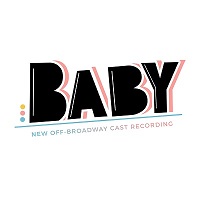 Off-Broadway Cast, 2023 (Yellow Sound Label)
Off-Broadway Cast, 2023 (Yellow Sound Label)  (2 / 5) For the Out of The Box Theatrics production of Baby, which had pre- and post-pandemic runs with slightly different casts in 2019 and 2021, lyricist Richard Maltby, Jr. collaborated with the Off-Broadway company’s leadership on a major revision of the show, including Sybille Pearson’s book. The biggest change is that the characters Pam and Nick are now Pam (Christina Sajous) and Nicki (Gabrielle McClinton), a lesbian couple struggling with IVF. The gorgeous voices and moving performances of Sajous and McClinton are the main reason to listen to this recording, even if the rewritten lyrics range from very effective (the ironic “Romance” works even better in the context of Pam’s injections) to overly on-the-nose (“Look, a turkey baster’s coming your way,” sings Nicki in the opening number). McClinton’s thoughtful “At Night She Comes Home to Me,” featuring some new verses, is also an improvement over the original. Most of the other discernible alterations are minor, including some sort-of-modernizing lyric swaps — such as, among the notable personages and characters name-checked in “I Want It All,” Althea Gibson replacing Scarlett O’Hara and Margaret Atwood replacing Margaret Thatcher. (Very different people!) Four 30-second “Transitions” that were not included in the OBC have made their way onto this recording; they help tie the score together, especially the choral “Transition #3—Commencement.” Johnny Link’s “I Chose Right” is sweetly affecting, and Julia Murney brings appropriate pathos to “Patterns,” but the majority of this album pales significantly in comparison to the superbly produced original recording. It’s hard not to miss Jonathan Tunick’s full orchestrations, which so superbly conveyed the inexpressible immensity of the pregnancy and birth experience. (This new album has some mixing issues, too, with the band often drowning out singers in ensemble moments.) The absence of expansiveness feels especially disappointing in the performance of the score’s greatest asset: the eruptive “The Story Goes On,” here rendered unconvincingly by Out of the Box’s founder Liz Flemming with frequent semi-spoken lines and abrupt shifts in vocal register that work against the song’s epic build. Credit Flemming, though, with giving Baby new life and giving us a ripe reminder of the score’s joys, even if they’re captured more potently on the 1983 cast album. — Dan Rubins
(2 / 5) For the Out of The Box Theatrics production of Baby, which had pre- and post-pandemic runs with slightly different casts in 2019 and 2021, lyricist Richard Maltby, Jr. collaborated with the Off-Broadway company’s leadership on a major revision of the show, including Sybille Pearson’s book. The biggest change is that the characters Pam and Nick are now Pam (Christina Sajous) and Nicki (Gabrielle McClinton), a lesbian couple struggling with IVF. The gorgeous voices and moving performances of Sajous and McClinton are the main reason to listen to this recording, even if the rewritten lyrics range from very effective (the ironic “Romance” works even better in the context of Pam’s injections) to overly on-the-nose (“Look, a turkey baster’s coming your way,” sings Nicki in the opening number). McClinton’s thoughtful “At Night She Comes Home to Me,” featuring some new verses, is also an improvement over the original. Most of the other discernible alterations are minor, including some sort-of-modernizing lyric swaps — such as, among the notable personages and characters name-checked in “I Want It All,” Althea Gibson replacing Scarlett O’Hara and Margaret Atwood replacing Margaret Thatcher. (Very different people!) Four 30-second “Transitions” that were not included in the OBC have made their way onto this recording; they help tie the score together, especially the choral “Transition #3—Commencement.” Johnny Link’s “I Chose Right” is sweetly affecting, and Julia Murney brings appropriate pathos to “Patterns,” but the majority of this album pales significantly in comparison to the superbly produced original recording. It’s hard not to miss Jonathan Tunick’s full orchestrations, which so superbly conveyed the inexpressible immensity of the pregnancy and birth experience. (This new album has some mixing issues, too, with the band often drowning out singers in ensemble moments.) The absence of expansiveness feels especially disappointing in the performance of the score’s greatest asset: the eruptive “The Story Goes On,” here rendered unconvincingly by Out of the Box’s founder Liz Flemming with frequent semi-spoken lines and abrupt shifts in vocal register that work against the song’s epic build. Credit Flemming, though, with giving Baby new life and giving us a ripe reminder of the score’s joys, even if they’re captured more potently on the 1983 cast album. — Dan Rubins
Babes in Arms
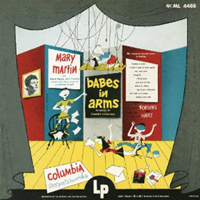 Studio Cast, 1951 (Columbia/Sony)
Studio Cast, 1951 (Columbia/Sony)  (2 / 5) Richard Rodgers and Lorenz Hart’s 1937 classic, the father of all those hey-kids-let’s-put-on-a-show movies with Mickey and Judy, has an expendable book and a gold-plated score: The first song on this recording is “Where or When,” and only a few tracks away are “I Wish I Were in Love Again,” “My Funny Valentine,” and “The Lady Is a Tramp.” While Babes in Arms was a good show to inaugurate Lehman Engel’s studio cast series, this 36-minute sampler LP plays more like “Mary Martin and Friends Sing Songs from Babes in Arms.” Miss M. commandeers most of the hit songs and overworks her adorableness, yet she delivers a spectacular “The Lady Is a Tramp.” Engel’s orchestrations reflect the originals, but they’re heavy on strings and include some obvious effects — whistles in “Johnny One Note,” clip-clops in “Way Out West.” Jack Cassidy leads a stirring performance of the title song, with chorus; he also brings intensity to “You Are So Fair,” but he doesn’t get to do the whole number. And Mardi Bayne, rather than singing both great verses of “Way Out West,” does the first one twice! How nuts is that? — Marc Miller
(2 / 5) Richard Rodgers and Lorenz Hart’s 1937 classic, the father of all those hey-kids-let’s-put-on-a-show movies with Mickey and Judy, has an expendable book and a gold-plated score: The first song on this recording is “Where or When,” and only a few tracks away are “I Wish I Were in Love Again,” “My Funny Valentine,” and “The Lady Is a Tramp.” While Babes in Arms was a good show to inaugurate Lehman Engel’s studio cast series, this 36-minute sampler LP plays more like “Mary Martin and Friends Sing Songs from Babes in Arms.” Miss M. commandeers most of the hit songs and overworks her adorableness, yet she delivers a spectacular “The Lady Is a Tramp.” Engel’s orchestrations reflect the originals, but they’re heavy on strings and include some obvious effects — whistles in “Johnny One Note,” clip-clops in “Way Out West.” Jack Cassidy leads a stirring performance of the title song, with chorus; he also brings intensity to “You Are So Fair,” but he doesn’t get to do the whole number. And Mardi Bayne, rather than singing both great verses of “Way Out West,” does the first one twice! How nuts is that? — Marc Miller
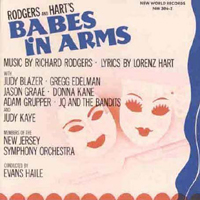 Studio Cast, 1989 (New World)
Studio Cast, 1989 (New World)  (4 / 5) Now, this is more like it: a nearly complete recording with restored Hans Spialek orchestrations, all the ballet music (Babes in Arms was a George Balanchine show), and Evans Haile energetically conducting the New Jersey Symphony Orchestra. All that’s missing is the now-unacceptable “All Dark People,” written by R&H as a specialty for the Nicholas Brothers. Although the ballet music isn’t all that interesting, the orchestrations are terrific, from the pearly celesta in “My Funny Valentine” to the twangs and woodwinds in “Way Out West.” There’s also some spiffy close-harmony work from the guy group JQ and the Bandits. While the casting is vocally deluxe, Judy Blazer, Gregg Edelman, Judy Kaye, and Jason Graae aren’t convincing age-wise as the needy teen offspring of down-on-their-luck vaudevillians. But it would be hard to top Blazer’s reading of “My Funny Valentine,” Kaye’s sarcasm in “Imagine,” or the sheer joy of the title song. It makes you want to go paint a barn, wheel the piano in, and start the auditions! — M.M.
(4 / 5) Now, this is more like it: a nearly complete recording with restored Hans Spialek orchestrations, all the ballet music (Babes in Arms was a George Balanchine show), and Evans Haile energetically conducting the New Jersey Symphony Orchestra. All that’s missing is the now-unacceptable “All Dark People,” written by R&H as a specialty for the Nicholas Brothers. Although the ballet music isn’t all that interesting, the orchestrations are terrific, from the pearly celesta in “My Funny Valentine” to the twangs and woodwinds in “Way Out West.” There’s also some spiffy close-harmony work from the guy group JQ and the Bandits. While the casting is vocally deluxe, Judy Blazer, Gregg Edelman, Judy Kaye, and Jason Graae aren’t convincing age-wise as the needy teen offspring of down-on-their-luck vaudevillians. But it would be hard to top Blazer’s reading of “My Funny Valentine,” Kaye’s sarcasm in “Imagine,” or the sheer joy of the title song. It makes you want to go paint a barn, wheel the piano in, and start the auditions! — M.M.
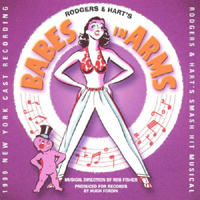 Encores! Concert Cast, 1999 (DRG)
Encores! Concert Cast, 1999 (DRG)  (4 / 5) This is a welcome addition to the musicals-in-concert canon. Surprisingly, it doesn’t surpass the 1989 studio version in terms of theatricality; the lead-in dialogue to the songs merely betrays what a wispy book Babes in Arms has. Rob Fisher’s conducting isn’t as vibrant as that of Evans Haile, but the orchestrations come through with more clarity here. Melissa Rain Anderson is no vocal match for Judy Kaye, nor can Erin Dilly wring nuances from a ballad as Judy Blazer can. But David Campbell is more ingratiating than Gregg Edelman and, in general, this cast is more age-appropriate than the other. The New World album has more ballet music, but this one has “All Dark People” — although it’s listed as “Light on Their Feet,” and only the verse lyrics are included. Which of the two most recent recordings to buy? The New World, 10 minutes longer, is for the archivists; the DRG has a less expert but more persuasively up-and-coming cast. As listening experiences, both are just dandy. — M.M.
(4 / 5) This is a welcome addition to the musicals-in-concert canon. Surprisingly, it doesn’t surpass the 1989 studio version in terms of theatricality; the lead-in dialogue to the songs merely betrays what a wispy book Babes in Arms has. Rob Fisher’s conducting isn’t as vibrant as that of Evans Haile, but the orchestrations come through with more clarity here. Melissa Rain Anderson is no vocal match for Judy Kaye, nor can Erin Dilly wring nuances from a ballad as Judy Blazer can. But David Campbell is more ingratiating than Gregg Edelman and, in general, this cast is more age-appropriate than the other. The New World album has more ballet music, but this one has “All Dark People” — although it’s listed as “Light on Their Feet,” and only the verse lyrics are included. Which of the two most recent recordings to buy? The New World, 10 minutes longer, is for the archivists; the DRG has a less expert but more persuasively up-and-coming cast. As listening experiences, both are just dandy. — M.M.
Man of La Mancha
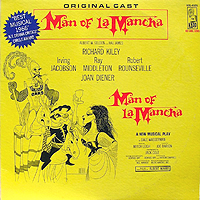 Original Broadway Cast, 1965 (Kapp/Decca)
Original Broadway Cast, 1965 (Kapp/Decca)  (5 / 5) This first recording of the Mitch Leigh-Joe Darion score for their musical inspired by Miguel de Cervantes’ epic novel Don Quixote is definitive. Richard Kiley is so vocally and dramatically brilliant as Cervantes/Quixote that he set the bar almost impossibly high for all future interpreters of the role. His fully committed, richly sung performance of the score’s signature item, “The Impossible Dream” — one of the last Broadway songs to become a pop hit in the 1960s — is all that anyone could ask for. Playing opposite him as Aldonza, Joan Diener gives an amazing vocal performance. She was one of those rare singing actresses who boasted a strong chest voice with a full soprano extension, and when Diener ends her powerfully belted performance of “It’s All the Same” with a flight into the soprano stratosphere, or when she switches back and forth between registers in “Aldonza,” the effect is breathtaking. Completing the musical’s central triumvirate, Irving Jacobson’s Sancho Panza is warm, funny, and endearing. Among the excellent supporting cast, the golden-voiced Robert Rounseville and Ray Middleton are the Padre and the Innkeeper, respectively. Harry Theyard, as a muleteer, offers two starkly contrasting performances of “Little Bird” — one gorgeously lyrical, the other frighteningly violent. Even though the flamenco rhythms employed by Leigh are inappropriate to the period, and some of Darion’s lyrics are ungrammatical, there is much to love about this score. If there’s anything to regret in the CD transfer of the recording, it’s that the “I, Don Quixote” number eliminates the terrifying Inquisition theme that begins this track on the LP. On the plus side, the technical quality of the digital remastering is superb. — Michael Portantiere
(5 / 5) This first recording of the Mitch Leigh-Joe Darion score for their musical inspired by Miguel de Cervantes’ epic novel Don Quixote is definitive. Richard Kiley is so vocally and dramatically brilliant as Cervantes/Quixote that he set the bar almost impossibly high for all future interpreters of the role. His fully committed, richly sung performance of the score’s signature item, “The Impossible Dream” — one of the last Broadway songs to become a pop hit in the 1960s — is all that anyone could ask for. Playing opposite him as Aldonza, Joan Diener gives an amazing vocal performance. She was one of those rare singing actresses who boasted a strong chest voice with a full soprano extension, and when Diener ends her powerfully belted performance of “It’s All the Same” with a flight into the soprano stratosphere, or when she switches back and forth between registers in “Aldonza,” the effect is breathtaking. Completing the musical’s central triumvirate, Irving Jacobson’s Sancho Panza is warm, funny, and endearing. Among the excellent supporting cast, the golden-voiced Robert Rounseville and Ray Middleton are the Padre and the Innkeeper, respectively. Harry Theyard, as a muleteer, offers two starkly contrasting performances of “Little Bird” — one gorgeously lyrical, the other frighteningly violent. Even though the flamenco rhythms employed by Leigh are inappropriate to the period, and some of Darion’s lyrics are ungrammatical, there is much to love about this score. If there’s anything to regret in the CD transfer of the recording, it’s that the “I, Don Quixote” number eliminates the terrifying Inquisition theme that begins this track on the LP. On the plus side, the technical quality of the digital remastering is superb. — Michael Portantiere
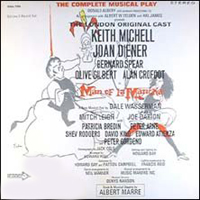 Original London Cast, 1968 (Decca, 2LPs/no CD)
Original London Cast, 1968 (Decca, 2LPs/no CD)  (3 / 5) While this is not really a “complete” Man of La Mancha, the two-LP set does give us a vivid sense of the show through its inclusion of the bulk of the script (by Dale Wasserman) and some well produced sound effects. Keith Michell is almost as magnificent a Cervantes/Quixote as the role’s creator, Richard Kiley, both dramatically and musically speaking. Joan Diener is back as Aldonza, but most unfortunately, her performance here is extremely over-acted and lacking in spontaneity; it sounds as if she had given up on playing the character, having decided instead to deliver a star turn. Despite this major caveat, the London Man of La Mancha deserves a CD release. With the glaring exception of Patricia Bredin as Antonia, who back-phrases most annoyingly in “I’m Only Thinking of Him,” the supporting cast is fine, especially Alan Crofoot as the Padre. The sound quality of the recording is excellent, and another plus is that we get to hear that chilling Inquisition theme more than once. — M.P.
(3 / 5) While this is not really a “complete” Man of La Mancha, the two-LP set does give us a vivid sense of the show through its inclusion of the bulk of the script (by Dale Wasserman) and some well produced sound effects. Keith Michell is almost as magnificent a Cervantes/Quixote as the role’s creator, Richard Kiley, both dramatically and musically speaking. Joan Diener is back as Aldonza, but most unfortunately, her performance here is extremely over-acted and lacking in spontaneity; it sounds as if she had given up on playing the character, having decided instead to deliver a star turn. Despite this major caveat, the London Man of La Mancha deserves a CD release. With the glaring exception of Patricia Bredin as Antonia, who back-phrases most annoyingly in “I’m Only Thinking of Him,” the supporting cast is fine, especially Alan Crofoot as the Padre. The sound quality of the recording is excellent, and another plus is that we get to hear that chilling Inquisition theme more than once. — M.P.
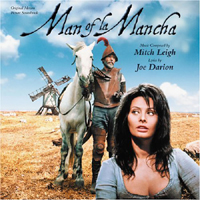 Film Soundtrack, 1972 (United Artists/Varese Sarabande) 0 stars; not recommended. What a disaster this is. On paper, Peter O’Toole and Sophia Loren would seem excellent casting for a film version of Man of La Mancha, providing that their singing voices were skillfully dubbed by others. Alas! Simon Gilbert, who ghosts for O’Toole, has a good-enough voice but very strange mannerisms of enunciation; just listen to him sing the lyric “thou art base and debauched as can be,” hitting every “b” with a sledgehammer. As for Loren, she was unwisely allowed to do her own singing here, and the results are borderline embarrassing. Her poorly supported, unpleasant sounding voice has about one-third the range required for Aldonza’s music, and her weirdly modified Italian accent is a further liability. Up against these two, James Coco manages to retain his dignity as Sancho, although he sings his part in “I, Don Quixote” down the octave from where it’s written. Ian Richardson has far too thin a voice for the Padre, but this is almost a moot point, as the beautiful song “To Each His Dulcinea” has been cut. The one good thing about this recording is that the orchestrations for symphony-sized forces were done skillfully; it’s nice to hear strings playing this score, even if the original orchestrations for a much smaller complement of musicians remain superior. — M.P.
Film Soundtrack, 1972 (United Artists/Varese Sarabande) 0 stars; not recommended. What a disaster this is. On paper, Peter O’Toole and Sophia Loren would seem excellent casting for a film version of Man of La Mancha, providing that their singing voices were skillfully dubbed by others. Alas! Simon Gilbert, who ghosts for O’Toole, has a good-enough voice but very strange mannerisms of enunciation; just listen to him sing the lyric “thou art base and debauched as can be,” hitting every “b” with a sledgehammer. As for Loren, she was unwisely allowed to do her own singing here, and the results are borderline embarrassing. Her poorly supported, unpleasant sounding voice has about one-third the range required for Aldonza’s music, and her weirdly modified Italian accent is a further liability. Up against these two, James Coco manages to retain his dignity as Sancho, although he sings his part in “I, Don Quixote” down the octave from where it’s written. Ian Richardson has far too thin a voice for the Padre, but this is almost a moot point, as the beautiful song “To Each His Dulcinea” has been cut. The one good thing about this recording is that the orchestrations for symphony-sized forces were done skillfully; it’s nice to hear strings playing this score, even if the original orchestrations for a much smaller complement of musicians remain superior. — M.P.
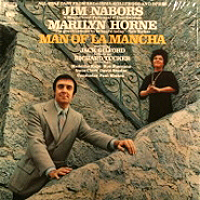 Studio Cast, 1972 (Columbia/no CD)
Studio Cast, 1972 (Columbia/no CD)  (2 / 5) This recording was only briefly in print, and it’s hard to find nowadays. Jim Nabors, famous as the star of the 1960s TV sitcom Gomer Pyle, USMC, possessed a legit baritone voice that gave him some additional career mileage, but his sound here is affected and unnaturally covered to the point of camp — certainly not the impression that a good Cervantes/Don Quixote is supposed to make. Singing the role of Aldonza is superstar opera diva Marilyn Horne in a frustrating performance; her magnificent mezzo is right for the role, but she sings “It’s All the Same” and other songs so squarely and with such low energy that they make little impression. That’s surprising, as Horne was famed as an excellent singing actress in opera, and she did very well with musical theater material on other occasions. (Perhaps she was under-rehearsed for this endeavor.) By far the best of the three principals is Jack Gilford, a wonderfully endearing Sancho. The supporting cast — Madeline Kahn as Antonia, Ron Hussman as the Innkeeper, and the great opera tenor Richard Tucker as the Padre — is uniformly excellent, and the original orchestrations are wisely used, but the unsatisfying performances of Horne and especially Nabors make this album little more than a curiosity. — M.P.
(2 / 5) This recording was only briefly in print, and it’s hard to find nowadays. Jim Nabors, famous as the star of the 1960s TV sitcom Gomer Pyle, USMC, possessed a legit baritone voice that gave him some additional career mileage, but his sound here is affected and unnaturally covered to the point of camp — certainly not the impression that a good Cervantes/Don Quixote is supposed to make. Singing the role of Aldonza is superstar opera diva Marilyn Horne in a frustrating performance; her magnificent mezzo is right for the role, but she sings “It’s All the Same” and other songs so squarely and with such low energy that they make little impression. That’s surprising, as Horne was famed as an excellent singing actress in opera, and she did very well with musical theater material on other occasions. (Perhaps she was under-rehearsed for this endeavor.) By far the best of the three principals is Jack Gilford, a wonderfully endearing Sancho. The supporting cast — Madeline Kahn as Antonia, Ron Hussman as the Innkeeper, and the great opera tenor Richard Tucker as the Padre — is uniformly excellent, and the original orchestrations are wisely used, but the unsatisfying performances of Horne and especially Nabors make this album little more than a curiosity. — M.P.
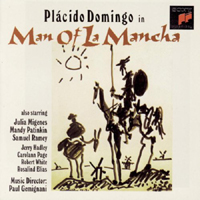 Studio Cast, 1990 (Sony)
Studio Cast, 1990 (Sony)  (2 / 5) There’s nothing terribly wrong about this recording aside from the presence of the outrageously mannered Mandy Patinkin as Sancho Panza. But, somehow, the whole thing doesn’t jell, even though the original orchestrations are expertly conducted here by Paul Gemignani. Opera icon Placido Domingo sings Quixote’s songs with all of the glorious tone you’d expect, but his Spanish accent is distracting — even though he is playing a Spanish character. (This is, after all, an American musical.) Julia Migenes is well cast and has many fine moments as Aldonza, but her performance isn’t as mercurial as Joan Diener’s on the original Broadway recording, and she doesn’t use her chest register in the same full-out way as Diener. Jerry Hadley’s tenor sounds lovely in the Padre’s songs, but though Samuel Ramey possessed one of the richest, fullest, and darkest bass voices in operatic history, it’s not a voice that’s appropriate to the Innkeeper — or, really, to any other musical theater role. This isn’t the worst recording of Man of La Mancha, but it’s very far from the best. — M.P.
(2 / 5) There’s nothing terribly wrong about this recording aside from the presence of the outrageously mannered Mandy Patinkin as Sancho Panza. But, somehow, the whole thing doesn’t jell, even though the original orchestrations are expertly conducted here by Paul Gemignani. Opera icon Placido Domingo sings Quixote’s songs with all of the glorious tone you’d expect, but his Spanish accent is distracting — even though he is playing a Spanish character. (This is, after all, an American musical.) Julia Migenes is well cast and has many fine moments as Aldonza, but her performance isn’t as mercurial as Joan Diener’s on the original Broadway recording, and she doesn’t use her chest register in the same full-out way as Diener. Jerry Hadley’s tenor sounds lovely in the Padre’s songs, but though Samuel Ramey possessed one of the richest, fullest, and darkest bass voices in operatic history, it’s not a voice that’s appropriate to the Innkeeper — or, really, to any other musical theater role. This isn’t the worst recording of Man of La Mancha, but it’s very far from the best. — M.P.
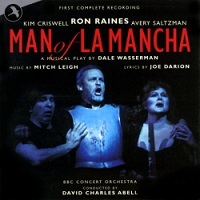 Covent Garden Music Festival Cast, 2000 (JAY, 2CDs)
Covent Garden Music Festival Cast, 2000 (JAY, 2CDs)  (2 / 5) Here’s a truly complete audio recording of Man of La Mancha –– the entire score, all of the dialogue, the whole nine yards. In the title role, Ron Raines is close to ideal from a vocal standpoint. His big, warm, powerful baritone is “legit” without sounding too heavily operatic, and his acting of the dialogue is strong, if not at the level of Keith Michell on the 1968 album. Less happily cast is Kim Criswell as Aldonza; her voice sounds wrong for the character in terms of type (not earthy enough), and she does quite a lot of shouting and growling in the lower-lying, more dramatic portions of the score. Her best performance is that of Aldonza’s most lyrical song, “What Does He Want of Me?” Avery Saltzman is an enjoyable Sancho in a sort of neo-vaudeville/Borscht Belt/American TV comedian style. In other roles, Hilton Marlton is a very British-sounding Padre who sings “To Each His Dulcinea” beautifully, and it’s nice to hear George Dvorsky in the two contrasting versions of “Little Bird.” The BBC Concert Orchestra plays excitingly under Charles Abel, aside from one or two odd tempo choices (e.g, some of the music for “The Abduction”), and the whole performance has a wonderful theatricality to it. Like the other complete recordings of musicals from JAY Records, this one would be commendable for that reason alone, over and above its other virtues. — M.P.
(2 / 5) Here’s a truly complete audio recording of Man of La Mancha –– the entire score, all of the dialogue, the whole nine yards. In the title role, Ron Raines is close to ideal from a vocal standpoint. His big, warm, powerful baritone is “legit” without sounding too heavily operatic, and his acting of the dialogue is strong, if not at the level of Keith Michell on the 1968 album. Less happily cast is Kim Criswell as Aldonza; her voice sounds wrong for the character in terms of type (not earthy enough), and she does quite a lot of shouting and growling in the lower-lying, more dramatic portions of the score. Her best performance is that of Aldonza’s most lyrical song, “What Does He Want of Me?” Avery Saltzman is an enjoyable Sancho in a sort of neo-vaudeville/Borscht Belt/American TV comedian style. In other roles, Hilton Marlton is a very British-sounding Padre who sings “To Each His Dulcinea” beautifully, and it’s nice to hear George Dvorsky in the two contrasting versions of “Little Bird.” The BBC Concert Orchestra plays excitingly under Charles Abel, aside from one or two odd tempo choices (e.g, some of the music for “The Abduction”), and the whole performance has a wonderful theatricality to it. Like the other complete recordings of musicals from JAY Records, this one would be commendable for that reason alone, over and above its other virtues. — M.P.
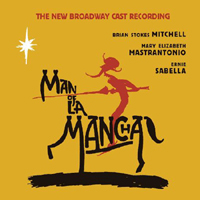 Broadway Cast, 2002 (RCA)
Broadway Cast, 2002 (RCA)  (1 / 5) Brian Stokes Mitchell’s performance as Coalhouse Walker in Ragtime was a triumph, but even judging solely on the basis of this recording, the role of Cervantes/Don Quixote in Man of La Mancha is not in his wheelhouse. While Mitchell possesses an impressive baritone, his singing style is ill-suited to this assignment; he slides off of some notes like a pop/jazz vocalist, and his grandstanding rendition of a pointlessly extended version of “The Impossible Dream” is off-putting. Equally disconcerting is his delivery of the dialogue that’s included here. When playing Cervantes, Mitchell sounds like a genial TV-sitcom actor, and when he morphs into the Quixote characterization, he assumes an oddly ponderous tone. Most of this production’s co-stars and supporting players are also miscast. As Aldonza, Mary Elizabeth Mastrantonio displays a beautiful soprano voice when she doesn’t have to push (as in the moving “What Does He Want of Me?”), but there are some harrowing moments when she switches vocal registers to negotiate the more challenging sections of the score (as in the final measures of “It’s All the Same”). And her delivery of dialogue is just as stylistically inappropriate as Mitchell’s, although for a different reason: This Aldonza sounds as if she came from Brooklyn. Ernie Sabella, vocally over-parted as Sancho Panza, has so much trouble with breath support that he chops up phrases willy-nilly. On the other hand, Mark Jacoby certainly has the goods for the role of the Padre, and Don Mayo sounds fine as the Innkeeper. It’s ironic that one of the best singers in the cast, Stephen Bogardus, has very little to sing as Sanson Carrasco. Aside from everything else, one final reason to dismiss this recording is that it doesn’t include the show’s stirring overture. — M.P.
(1 / 5) Brian Stokes Mitchell’s performance as Coalhouse Walker in Ragtime was a triumph, but even judging solely on the basis of this recording, the role of Cervantes/Don Quixote in Man of La Mancha is not in his wheelhouse. While Mitchell possesses an impressive baritone, his singing style is ill-suited to this assignment; he slides off of some notes like a pop/jazz vocalist, and his grandstanding rendition of a pointlessly extended version of “The Impossible Dream” is off-putting. Equally disconcerting is his delivery of the dialogue that’s included here. When playing Cervantes, Mitchell sounds like a genial TV-sitcom actor, and when he morphs into the Quixote characterization, he assumes an oddly ponderous tone. Most of this production’s co-stars and supporting players are also miscast. As Aldonza, Mary Elizabeth Mastrantonio displays a beautiful soprano voice when she doesn’t have to push (as in the moving “What Does He Want of Me?”), but there are some harrowing moments when she switches vocal registers to negotiate the more challenging sections of the score (as in the final measures of “It’s All the Same”). And her delivery of dialogue is just as stylistically inappropriate as Mitchell’s, although for a different reason: This Aldonza sounds as if she came from Brooklyn. Ernie Sabella, vocally over-parted as Sancho Panza, has so much trouble with breath support that he chops up phrases willy-nilly. On the other hand, Mark Jacoby certainly has the goods for the role of the Padre, and Don Mayo sounds fine as the Innkeeper. It’s ironic that one of the best singers in the cast, Stephen Bogardus, has very little to sing as Sanson Carrasco. Aside from everything else, one final reason to dismiss this recording is that it doesn’t include the show’s stirring overture. — M.P.
Mamma Mia!
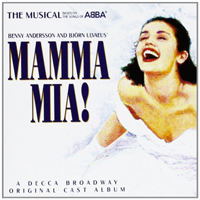 Original London Cast, 1999 (Decca)
Original London Cast, 1999 (Decca)  (2 / 5) Die-hard musical theater fans love to hate this international mega-hit, which showcases two dozen songs by the hugely popular 1970s Swedish pop group ABBA. It was arguably the first and one of very few musicals to date that achieved great success at the box office by working pre-existing tunes into a new libretto. Well, in this case, sort of new: Catherine Johnson’s book is remarkably similar to the screenplay plot of Buona Sera, Mrs. Campbell, which also inspired the flop Broadway musical Carmelina. The heroine of Mamma Mia! is Donna, who keeps a tavern on a tiny Greek island and is making plans for the wedding of her daughter, Sophie. Wanting to find out who her father is, Sophie invites the three most likely candidates to the wedding, thereby setting the stage for farcical complications. The songs, by Benny Andersson and Björn Ulvaeus (the male half of ABBA; Stig Anderson also contributed), often have only the barest acquaintance with the story, and at any rate, the album contains no plot synopsis. This Euro-pop is irresistible, the no-star London cast performs with verve, the songs are well arranged by Martin Koch to emulate the original versions — and yet, the recording isn’t really necessary, given the existence of the greatest hits collection ABBA Gold. — David Barbour
(2 / 5) Die-hard musical theater fans love to hate this international mega-hit, which showcases two dozen songs by the hugely popular 1970s Swedish pop group ABBA. It was arguably the first and one of very few musicals to date that achieved great success at the box office by working pre-existing tunes into a new libretto. Well, in this case, sort of new: Catherine Johnson’s book is remarkably similar to the screenplay plot of Buona Sera, Mrs. Campbell, which also inspired the flop Broadway musical Carmelina. The heroine of Mamma Mia! is Donna, who keeps a tavern on a tiny Greek island and is making plans for the wedding of her daughter, Sophie. Wanting to find out who her father is, Sophie invites the three most likely candidates to the wedding, thereby setting the stage for farcical complications. The songs, by Benny Andersson and Björn Ulvaeus (the male half of ABBA; Stig Anderson also contributed), often have only the barest acquaintance with the story, and at any rate, the album contains no plot synopsis. This Euro-pop is irresistible, the no-star London cast performs with verve, the songs are well arranged by Martin Koch to emulate the original versions — and yet, the recording isn’t really necessary, given the existence of the greatest hits collection ABBA Gold. — David Barbour
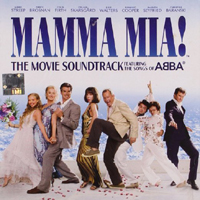 Film Soundtrack, 2008 (Polydor)
Film Soundtrack, 2008 (Polydor)  (1 / 5) The London cast album was charming, if unnecessary. This recording is merely unnecessary. Think “karaoke night in a Malibu bar” and you’ve got an idea of this misbegotten project, in which a group of stars who are mostly under-endowed vocally try to demonstrate their pop musical comedy chops. Two of them do have the goods: Christine Baranski has a fun time partnering with actor Philip Michael on “Does Your Mother Know,” and Meryl Streep makes something reasonably touching out of “The Winner Takes it All.” Otherwise, the cast of wobbly warblers is largely drowned out by Gorän Arnberg’s bombastic orchestrations. The men fare worst: In “Our Last Summer,” Colin Firth, Pierce Brosnan, and Stellan Skarsgård seem locked in a competition to see who can sing the flattest. Brosnan is even worse in “When All is Said and Done,” a song not used in the stage edition of Mamma Mia! Oddly, one of the few pleasing tracks here is an extra of Amanda Seyfried offering a sensitive version of “I Have a Dream/Thank You for the Music.” The latter is performed only with piano accompaniment, and after all the preceding noise, it’s rather restful. — D.B.
(1 / 5) The London cast album was charming, if unnecessary. This recording is merely unnecessary. Think “karaoke night in a Malibu bar” and you’ve got an idea of this misbegotten project, in which a group of stars who are mostly under-endowed vocally try to demonstrate their pop musical comedy chops. Two of them do have the goods: Christine Baranski has a fun time partnering with actor Philip Michael on “Does Your Mother Know,” and Meryl Streep makes something reasonably touching out of “The Winner Takes it All.” Otherwise, the cast of wobbly warblers is largely drowned out by Gorän Arnberg’s bombastic orchestrations. The men fare worst: In “Our Last Summer,” Colin Firth, Pierce Brosnan, and Stellan Skarsgård seem locked in a competition to see who can sing the flattest. Brosnan is even worse in “When All is Said and Done,” a song not used in the stage edition of Mamma Mia! Oddly, one of the few pleasing tracks here is an extra of Amanda Seyfried offering a sensitive version of “I Have a Dream/Thank You for the Music.” The latter is performed only with piano accompaniment, and after all the preceding noise, it’s rather restful. — D.B.
Mame
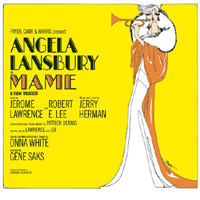 Original Broadway Cast, 1966 (Columbia/Sony)
Original Broadway Cast, 1966 (Columbia/Sony)  (5 / 5) Seldom has a cast recording captured the thrill and excitement of a smash Broadway musical as well as this one does. From the spectacular opening bars of the overture to the huge finale, you can hear and feel the joy of the entire company. The album is so well produced that listening to it is almost like having the entire show performed in your living room. And what a cast! Angela Lansbury, in perhaps the greatest role of her long career, is an unsurpassed Mame. Her voice is rich and melodic, and her wit comes through clearly; it’s a treat to hear such a wonderful blend of acting and singing talent. Beatrice Arthur delivers a droll Vera Charles that will have you laughing out loud; “Bosom Buddies,” her duet with Lansbury, is hilarious. Frankie Michaels as Young Patrick has an amazing singing voice, while Jane Connell’s rendition of “Gooch’s Song” is-one of the great comedic performances in musical theater history. Jerry Herman’s music is among his very best, and his lyrics are sharp, funny, and impeccably crafted. The orchestra is thrillingly conducted by Donald Pippin. Mame actually improves upon the wonderful novel on which it was based, Patrick Dennis’ Auntie Mame, and its subsequent straight play and film adaptations. As wonderful as those versions may be, you can’t help missing great songs like “It’s Today,” “We Need a Little Christmas,” “If He Walked Into My Life” — and, of course, the show-stopping title tune of the musical. All of these are rendered definitively here, and there are interesting bonus tracks of Jerry Herman singing demo versions of several numbers. — Gerard Alessandrini
(5 / 5) Seldom has a cast recording captured the thrill and excitement of a smash Broadway musical as well as this one does. From the spectacular opening bars of the overture to the huge finale, you can hear and feel the joy of the entire company. The album is so well produced that listening to it is almost like having the entire show performed in your living room. And what a cast! Angela Lansbury, in perhaps the greatest role of her long career, is an unsurpassed Mame. Her voice is rich and melodic, and her wit comes through clearly; it’s a treat to hear such a wonderful blend of acting and singing talent. Beatrice Arthur delivers a droll Vera Charles that will have you laughing out loud; “Bosom Buddies,” her duet with Lansbury, is hilarious. Frankie Michaels as Young Patrick has an amazing singing voice, while Jane Connell’s rendition of “Gooch’s Song” is-one of the great comedic performances in musical theater history. Jerry Herman’s music is among his very best, and his lyrics are sharp, funny, and impeccably crafted. The orchestra is thrillingly conducted by Donald Pippin. Mame actually improves upon the wonderful novel on which it was based, Patrick Dennis’ Auntie Mame, and its subsequent straight play and film adaptations. As wonderful as those versions may be, you can’t help missing great songs like “It’s Today,” “We Need a Little Christmas,” “If He Walked Into My Life” — and, of course, the show-stopping title tune of the musical. All of these are rendered definitively here, and there are interesting bonus tracks of Jerry Herman singing demo versions of several numbers. — Gerard Alessandrini
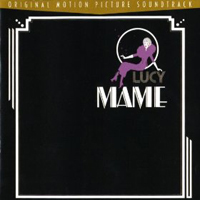 Film Soundtrack, 1974 (Warner Bros./Rhino) No stars; not recommended. All elements of the Broadway smash hit pointed toward Mame being turned into a wonderful movie musical, but it misfired on the big screen. The soundtrack album reveals how Lucille Ball’s lack of voice and musicality sabotaged the film more than any of its other flaws. As much as we all love Lucy, her singing here is unlistenable; she sounds ill at ease performing numbers written for someone with the vocal chops of a Judy Garland. Some of the choral work on this recording is very nice, but the orchestral arrangements are wanting. And although Bea Arthur and Jane Connell reprise the original roles for which they earned acclaim on Broadway, even they sound uncomfortable here. Only Robert Preston as Beau Burnside has a stellar moment when he sings “Loving You,” an excellent song that Jerry Herman composed expressly for the movie. — G.A.
Film Soundtrack, 1974 (Warner Bros./Rhino) No stars; not recommended. All elements of the Broadway smash hit pointed toward Mame being turned into a wonderful movie musical, but it misfired on the big screen. The soundtrack album reveals how Lucille Ball’s lack of voice and musicality sabotaged the film more than any of its other flaws. As much as we all love Lucy, her singing here is unlistenable; she sounds ill at ease performing numbers written for someone with the vocal chops of a Judy Garland. Some of the choral work on this recording is very nice, but the orchestral arrangements are wanting. And although Bea Arthur and Jane Connell reprise the original roles for which they earned acclaim on Broadway, even they sound uncomfortable here. Only Robert Preston as Beau Burnside has a stellar moment when he sings “Loving You,” an excellent song that Jerry Herman composed expressly for the movie. — G.A.
The Magic Show
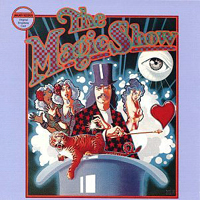 Original Broadway Cast, 1973 (Bell/January Records)
Original Broadway Cast, 1973 (Bell/January Records)  (3 / 5) This musical got the worst reviews imaginable but ran five years, thanks to its star, who could not act, sing, or dance but was a magician unlike any we’d ever seen. A skinny little hippie in jeans with a fresh, artless, chipmunk-cheeked persona, Doug Henning created illusions so startling and imaginative that the show’s hideous physical production and the basic crumminess of its book didn’t matter. On the cast album, Stephen Schwartz’s songs jump lightly from one pop genre to another in a casual, genial style of writing. This is a brief score and a minor one, but it’s not without its pleasures. The only interestingly conceived character is a beautiful young woman named Charmin, who in the show materialized before our eyes in a plexiglass box. Whenever any magician needs to conjure up a beautiful woman, it’s her — and she’s sick of it. “Charmin’s Lament,” a mock country-western number, is performed by the funny, genuinely sexy Anita Morris. Although “Lion Tamer” may be a bit too on-the-nose as ingenue Dale Soules’ first song, it’s still appealing. David Ogden Stiers’ villainous set piece “Style” is helped by the cheerful oddness of its music, as is “Two’s Company.” The most well remembered number of the score is probably “West End Avenue. ” Belted intensely by Soules, the song is skillful and effective if a tad overwrought. Henning doesn’t sing at all; his entire performance on the cast album consists of one line, spoken unsurely. — David Wolf
(3 / 5) This musical got the worst reviews imaginable but ran five years, thanks to its star, who could not act, sing, or dance but was a magician unlike any we’d ever seen. A skinny little hippie in jeans with a fresh, artless, chipmunk-cheeked persona, Doug Henning created illusions so startling and imaginative that the show’s hideous physical production and the basic crumminess of its book didn’t matter. On the cast album, Stephen Schwartz’s songs jump lightly from one pop genre to another in a casual, genial style of writing. This is a brief score and a minor one, but it’s not without its pleasures. The only interestingly conceived character is a beautiful young woman named Charmin, who in the show materialized before our eyes in a plexiglass box. Whenever any magician needs to conjure up a beautiful woman, it’s her — and she’s sick of it. “Charmin’s Lament,” a mock country-western number, is performed by the funny, genuinely sexy Anita Morris. Although “Lion Tamer” may be a bit too on-the-nose as ingenue Dale Soules’ first song, it’s still appealing. David Ogden Stiers’ villainous set piece “Style” is helped by the cheerful oddness of its music, as is “Two’s Company.” The most well remembered number of the score is probably “West End Avenue. ” Belted intensely by Soules, the song is skillful and effective if a tad overwrought. Henning doesn’t sing at all; his entire performance on the cast album consists of one line, spoken unsurely. — David Wolf
Maggie Flynn
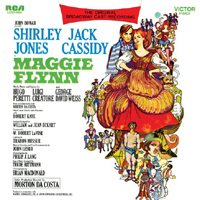 Original Broadway Cast, 1968 (RCA/DRG)
Original Broadway Cast, 1968 (RCA/DRG)  (3 / 5) Hardly remembered today, this show has had only one small-scale revival. It marked the return of Shirley Jones to Broadway, where she began her career in choruses before going on to star in the film versions of great musicals. Playing opposite her was her husband, Broadway veteran Jack Cassidy. Maggie Flynn was directed by Morton DaCosta, who had helmed such hits as Auntie Mame and The Music Man. The book, music, and lyrics were a collaboration of Hugo Peretti, Luigi Creatore, and George David Weiss. With encouraging out-of-town reviews, the musical seemed to have everything going for it, but it opened in New York to decidedly mixed notices. “The Thank-You Song” may seem to be a poor man’s “Do-Re-Mi,” but there’s more to Maggie Flynn than that number. Cleverly using the New York City draft riots of 1863 as background for a romance as well as a story of racial tolerance, the show has a tuneful score that made for a really fine cast album. “Why Can’t I Walk Away?” is powerfully sung by Cassidy as Maggie’s ex-husband Phineas. Whether delivering the lullaby “Pitter Patter” or the rousing “Mr. Clown,” Cassidy uses his voice to great advantage. As Maggie, who runs an orphanage for black children, Jones sings beautifully in the clear-as-abell soprano that helped make her a star, and she’s just as engaging when belting out the cheery “Nice Cold Morning” and the sly “I Wouldn’t Have You Any Other Way.” Among the orphans are future stars Stephanie Mills, Irene Cara, and Giancarlo Esposito; the group as a whole sounds glorious, especially in the chilling “The Game of War.” Robert R. Kaye is in fine voice as Colonel Farrady (Maggie’s beau). The title tune is introduced as a ballad for Cassidy and later turns into an up-tempo production number. The recording concludes with Jones singing “Mr. Clown” while Cassidy sings “Maggie Flynn,” the two songs fitting together perfectly. — Jeffrey Dunn
(3 / 5) Hardly remembered today, this show has had only one small-scale revival. It marked the return of Shirley Jones to Broadway, where she began her career in choruses before going on to star in the film versions of great musicals. Playing opposite her was her husband, Broadway veteran Jack Cassidy. Maggie Flynn was directed by Morton DaCosta, who had helmed such hits as Auntie Mame and The Music Man. The book, music, and lyrics were a collaboration of Hugo Peretti, Luigi Creatore, and George David Weiss. With encouraging out-of-town reviews, the musical seemed to have everything going for it, but it opened in New York to decidedly mixed notices. “The Thank-You Song” may seem to be a poor man’s “Do-Re-Mi,” but there’s more to Maggie Flynn than that number. Cleverly using the New York City draft riots of 1863 as background for a romance as well as a story of racial tolerance, the show has a tuneful score that made for a really fine cast album. “Why Can’t I Walk Away?” is powerfully sung by Cassidy as Maggie’s ex-husband Phineas. Whether delivering the lullaby “Pitter Patter” or the rousing “Mr. Clown,” Cassidy uses his voice to great advantage. As Maggie, who runs an orphanage for black children, Jones sings beautifully in the clear-as-abell soprano that helped make her a star, and she’s just as engaging when belting out the cheery “Nice Cold Morning” and the sly “I Wouldn’t Have You Any Other Way.” Among the orphans are future stars Stephanie Mills, Irene Cara, and Giancarlo Esposito; the group as a whole sounds glorious, especially in the chilling “The Game of War.” Robert R. Kaye is in fine voice as Colonel Farrady (Maggie’s beau). The title tune is introduced as a ballad for Cassidy and later turns into an up-tempo production number. The recording concludes with Jones singing “Mr. Clown” while Cassidy sings “Maggie Flynn,” the two songs fitting together perfectly. — Jeffrey Dunn
Magdalena
 New York Concert Cast, 1988 (CBS)
New York Concert Cast, 1988 (CBS)  (4 / 5) This is a musically adventurous, complex, and unruly Colombian stew by Heitor Villa-Lobos. The show was a flop on Broadway in 1948, but an admired one that was brought back decades later in a Lincoln Center concert version. The melodies, harmonies, and intricate rhythms of Magdalena sound like no other Broadway score, and the composer’s use of contrapuntal rhythms and strains — a player piano in the middle of a priest’s reverie, a pagan uprising during a state ceremony — is as sophisticated as in any opera. His orchestrations are dazzling, too, combining South American folk motifs with the sounds of late’40s Broadway. Unfortunately, the story that librettist Homer Curran and lyricists Robert Wright and George Forrest concocted is incomprehensible and annoyingly pious; the dull, religious heroine triumphs, but the fun-loving heathens have the best material. Some of the ballads and recitatives are faux-naif and bogus, but if you can endure those failings, you’ll be rewarded with a lavish, well-sung musical presentation based on the Lincoln Center concert. The witty “Food for Thought” lyrics, trilled to perfection by villainess Judy Kaye, and her later “Piece de Resistance”stand out. There’s also fine work from George Rose in one of his last roles, hamming it up lustily as a corrupt general. The romantic leads, Faith Esham and Kevin Gray, seem a little pallid by comparison, but they’re unfairly weighted down by all that shallow dialogue. Evans Haile conducts an enormous orchestra and chorus masterfully, and the flow of imaginative Villa-Lobos music is unending. A special nod to percussionist Patrick Smith, who is probably recuperating still. — Marc Miller
(4 / 5) This is a musically adventurous, complex, and unruly Colombian stew by Heitor Villa-Lobos. The show was a flop on Broadway in 1948, but an admired one that was brought back decades later in a Lincoln Center concert version. The melodies, harmonies, and intricate rhythms of Magdalena sound like no other Broadway score, and the composer’s use of contrapuntal rhythms and strains — a player piano in the middle of a priest’s reverie, a pagan uprising during a state ceremony — is as sophisticated as in any opera. His orchestrations are dazzling, too, combining South American folk motifs with the sounds of late’40s Broadway. Unfortunately, the story that librettist Homer Curran and lyricists Robert Wright and George Forrest concocted is incomprehensible and annoyingly pious; the dull, religious heroine triumphs, but the fun-loving heathens have the best material. Some of the ballads and recitatives are faux-naif and bogus, but if you can endure those failings, you’ll be rewarded with a lavish, well-sung musical presentation based on the Lincoln Center concert. The witty “Food for Thought” lyrics, trilled to perfection by villainess Judy Kaye, and her later “Piece de Resistance”stand out. There’s also fine work from George Rose in one of his last roles, hamming it up lustily as a corrupt general. The romantic leads, Faith Esham and Kevin Gray, seem a little pallid by comparison, but they’re unfairly weighted down by all that shallow dialogue. Evans Haile conducts an enormous orchestra and chorus masterfully, and the flow of imaginative Villa-Lobos music is unending. A special nod to percussionist Patrick Smith, who is probably recuperating still. — Marc Miller
The Mad Show
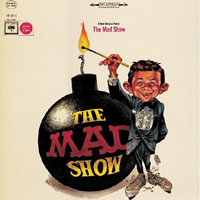 Original Broadway Cast, 1966 (Columbia/DRG)
Original Broadway Cast, 1966 (Columbia/DRG)  (4 / 5) Marshall Barer was an unsung genius lyricist of the musical theater; his output was slight in terms of quantity, but he could write a ballad or comic song with a felicity equal to anyone in the field. The Mad Show, a reunion with his Once Upon a Mattress collaborator Mary Rodgers, yielded one of the funniest recordings in cast album history. Of course, it helps if you’re tuned in to the anarchic (and New York Jewish) humor of Mad magazine. The excellence of the revue, the unity of its components, and its terrific cast all shine through on the recording. Here are Linda Lavin, JoAnne Worley, MacIntyre Dixon, Richard Libertini, and Paul Sand in the show that propelled their long, distinguished careers. A highlight of the album is a non-Barer song, “The Boy From,” which all good musical comedy queens (err, fans) know was credited to Rodgers and “Esteban Ria Nido” — a pseudonym for Stephen Sondheim. The Mad Show ran for almost nine hundred performances. Unfortunately, when the show was released for production by regional groups, it was in a bowdlerized version. To add insult to injury, the recording wasn’t issued on CD until 2005, when DRG happily remedied that situation. — Ken Bloom
(4 / 5) Marshall Barer was an unsung genius lyricist of the musical theater; his output was slight in terms of quantity, but he could write a ballad or comic song with a felicity equal to anyone in the field. The Mad Show, a reunion with his Once Upon a Mattress collaborator Mary Rodgers, yielded one of the funniest recordings in cast album history. Of course, it helps if you’re tuned in to the anarchic (and New York Jewish) humor of Mad magazine. The excellence of the revue, the unity of its components, and its terrific cast all shine through on the recording. Here are Linda Lavin, JoAnne Worley, MacIntyre Dixon, Richard Libertini, and Paul Sand in the show that propelled their long, distinguished careers. A highlight of the album is a non-Barer song, “The Boy From,” which all good musical comedy queens (err, fans) know was credited to Rodgers and “Esteban Ria Nido” — a pseudonym for Stephen Sondheim. The Mad Show ran for almost nine hundred performances. Unfortunately, when the show was released for production by regional groups, it was in a bowdlerized version. To add insult to injury, the recording wasn’t issued on CD until 2005, when DRG happily remedied that situation. — Ken Bloom

